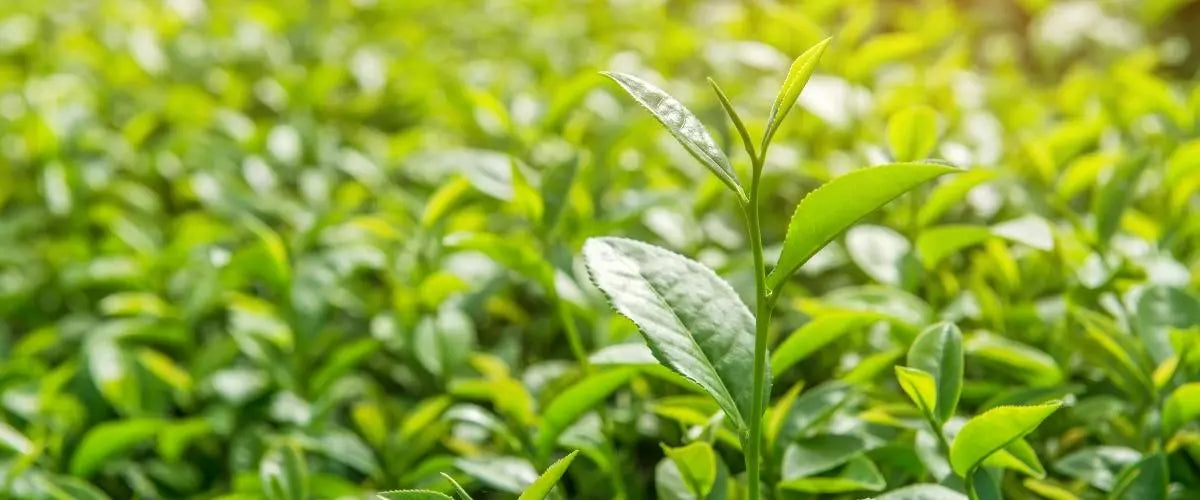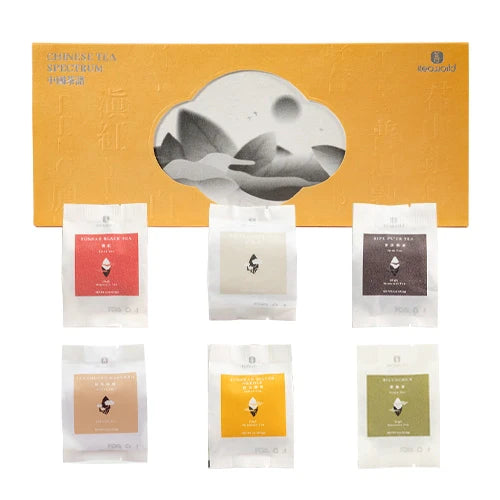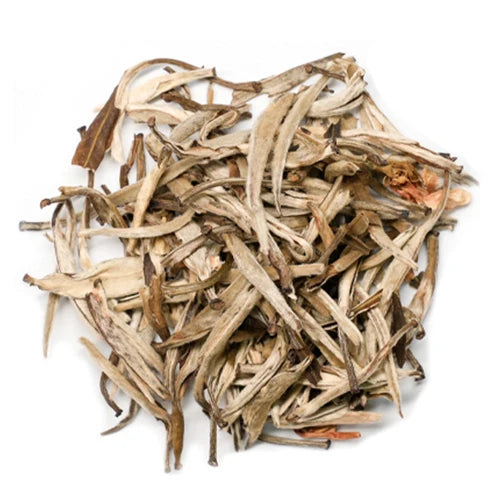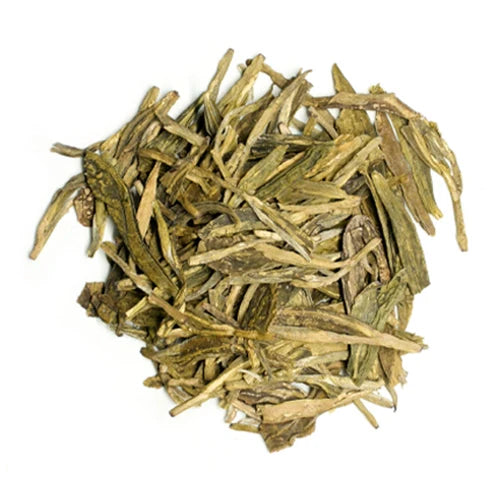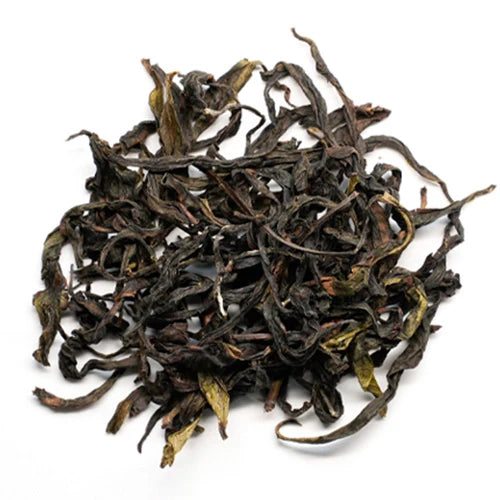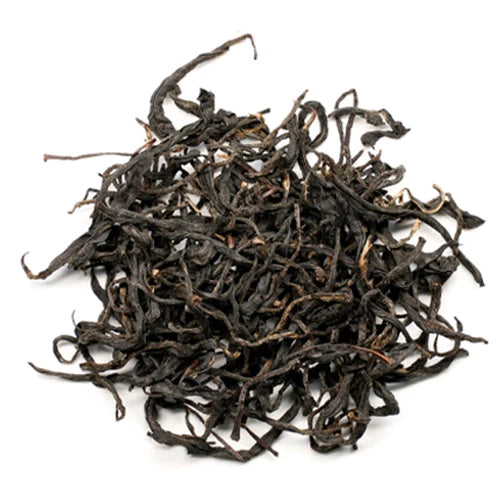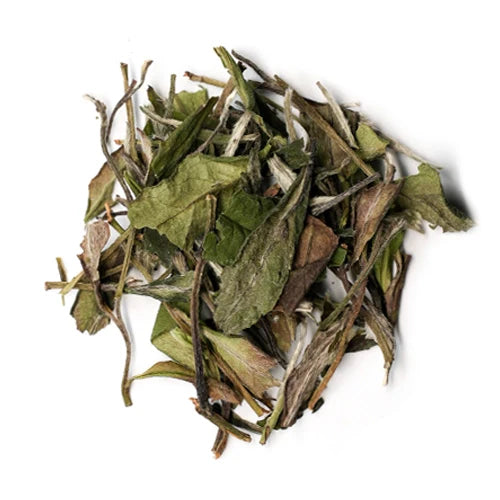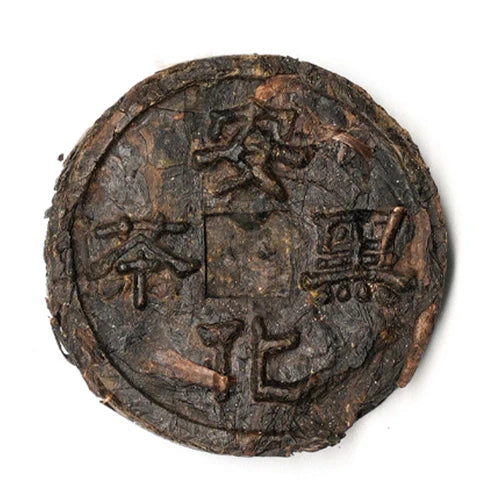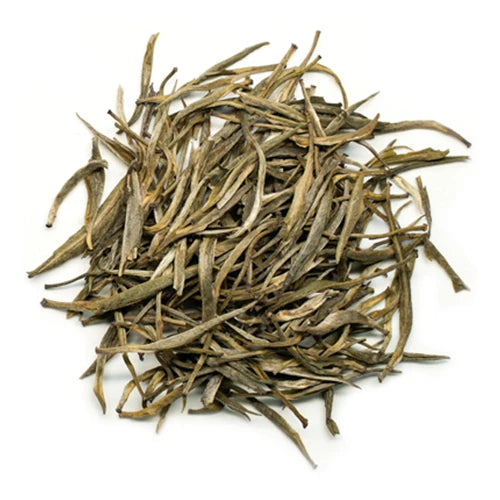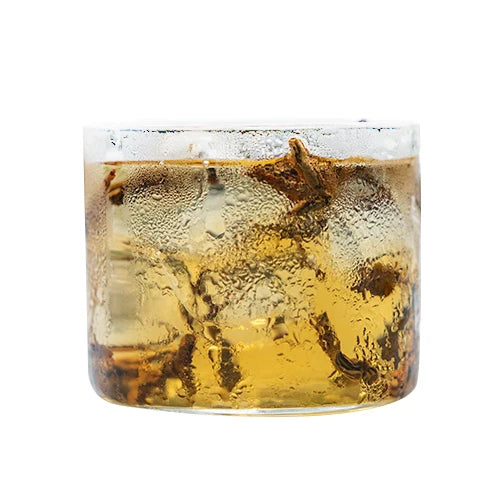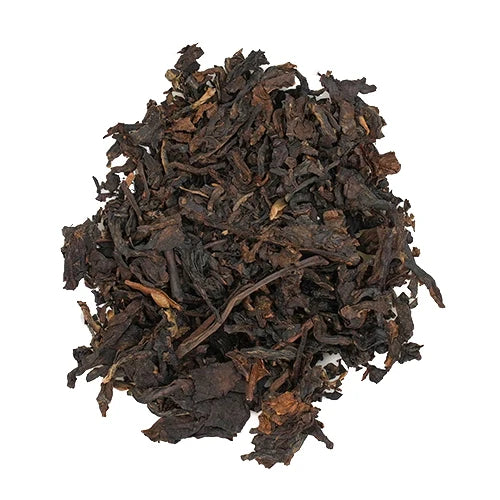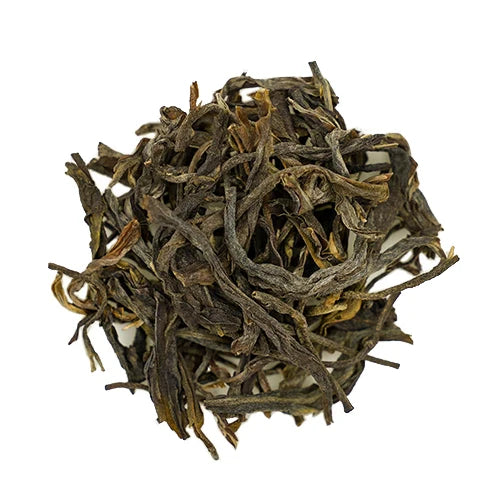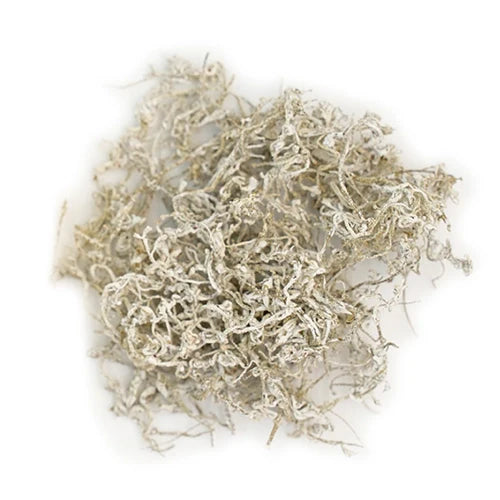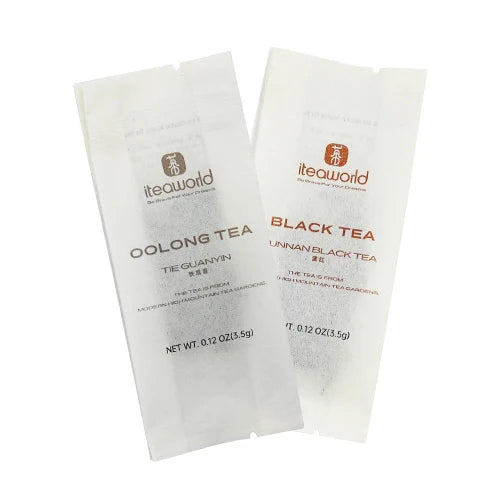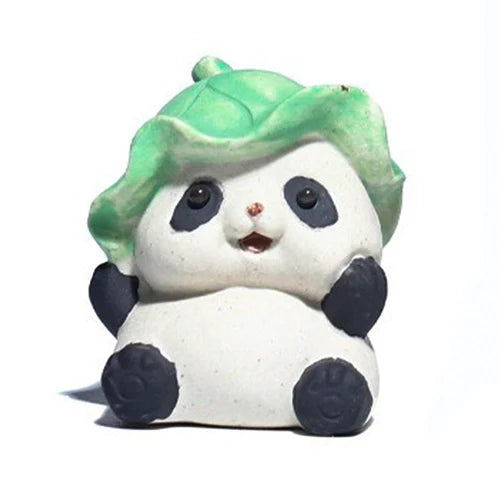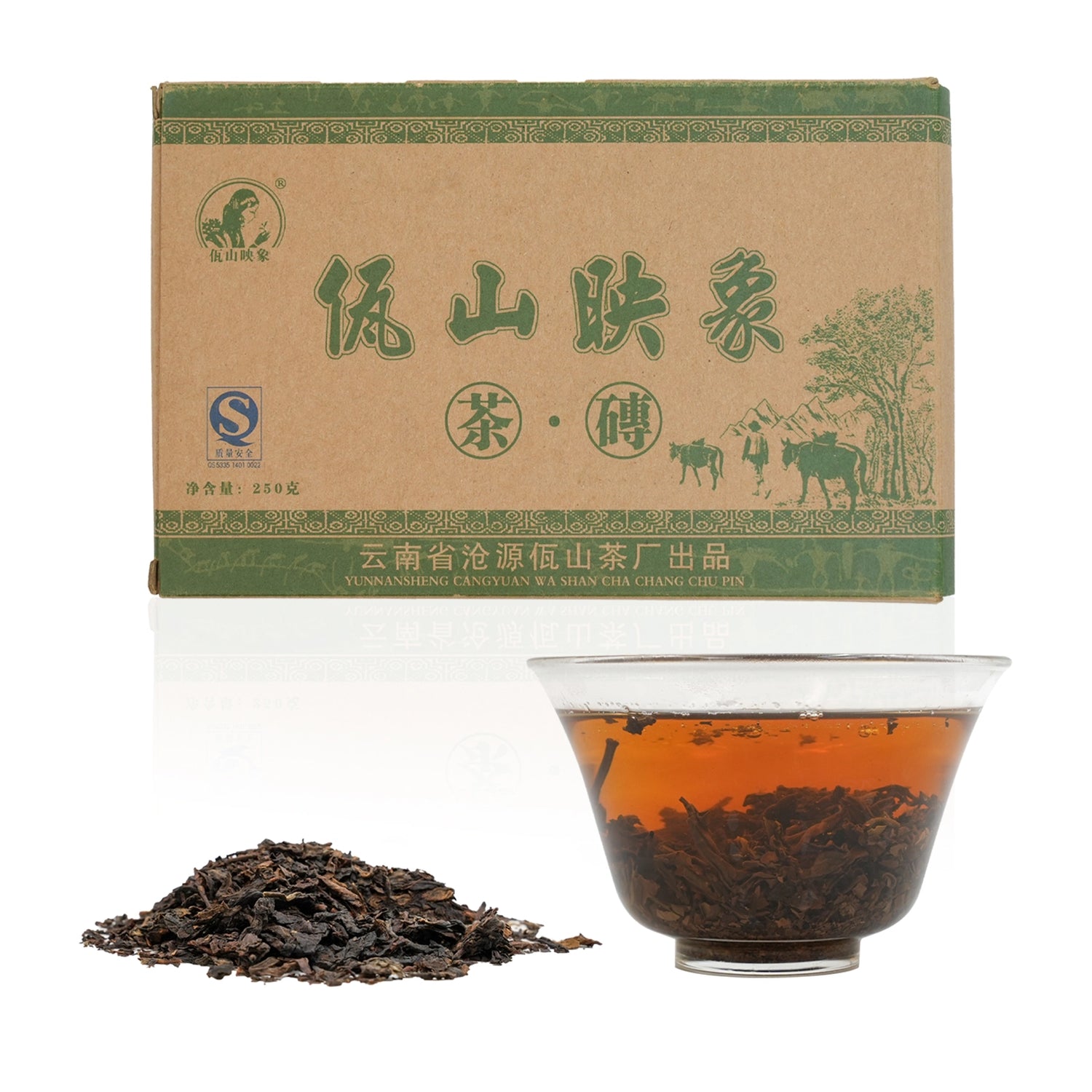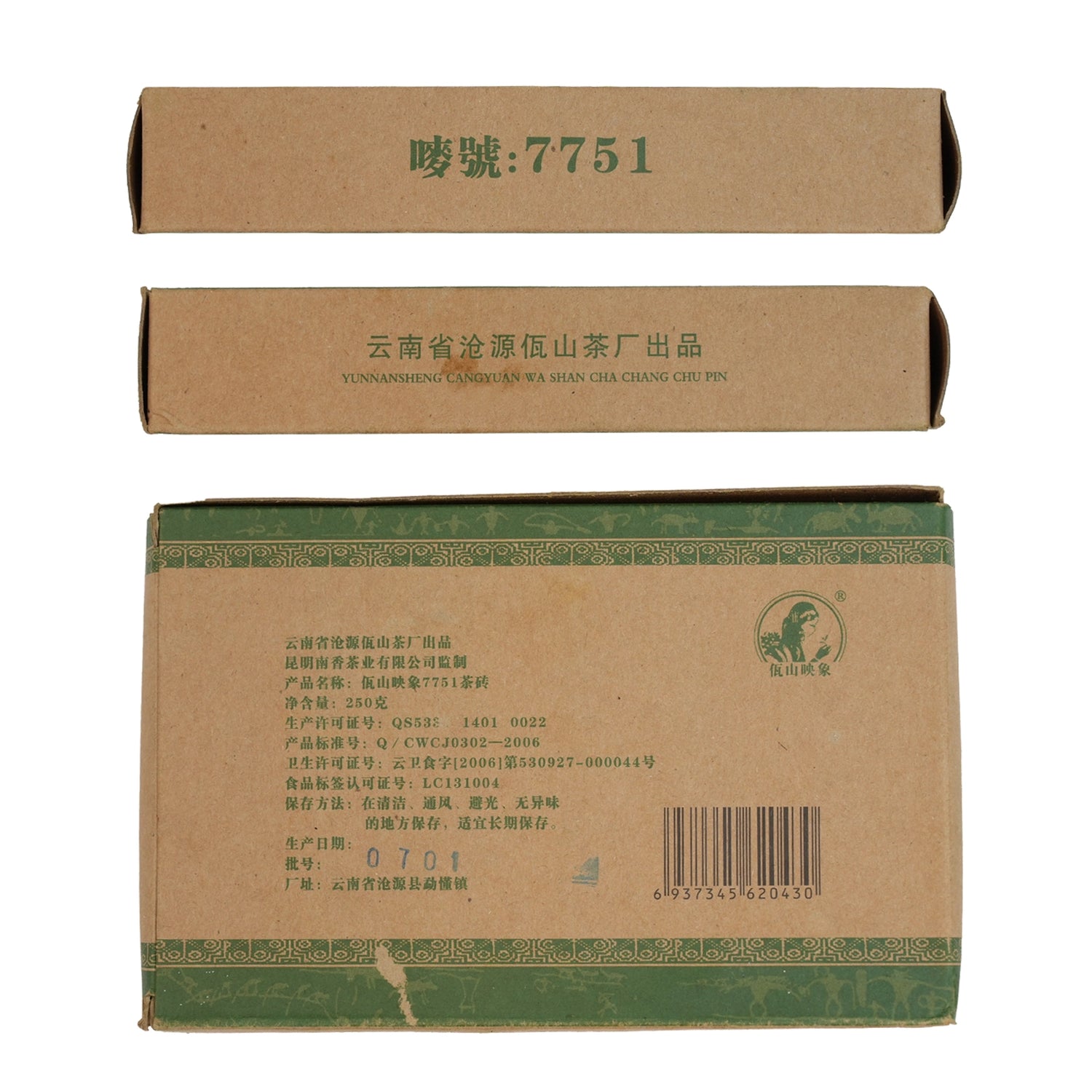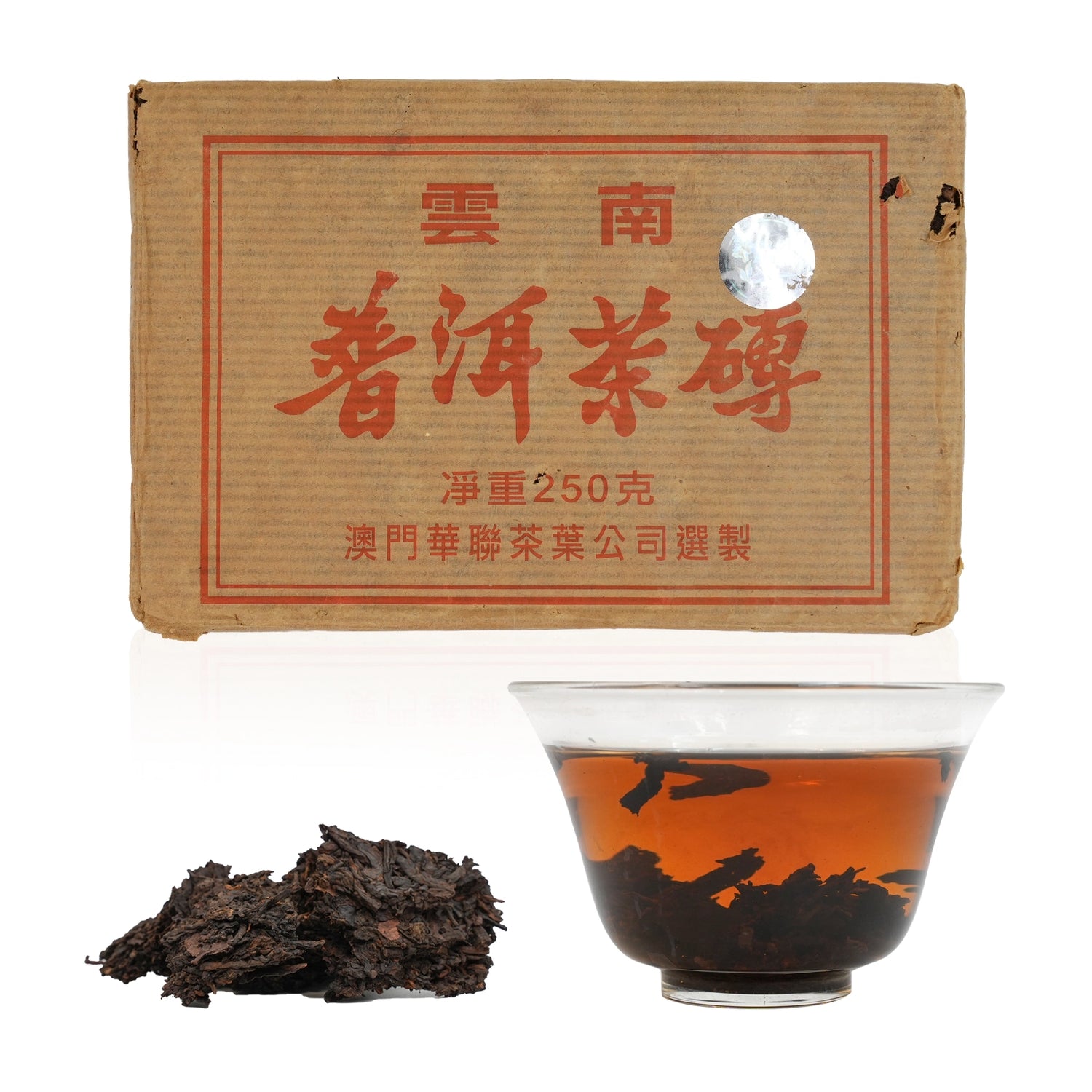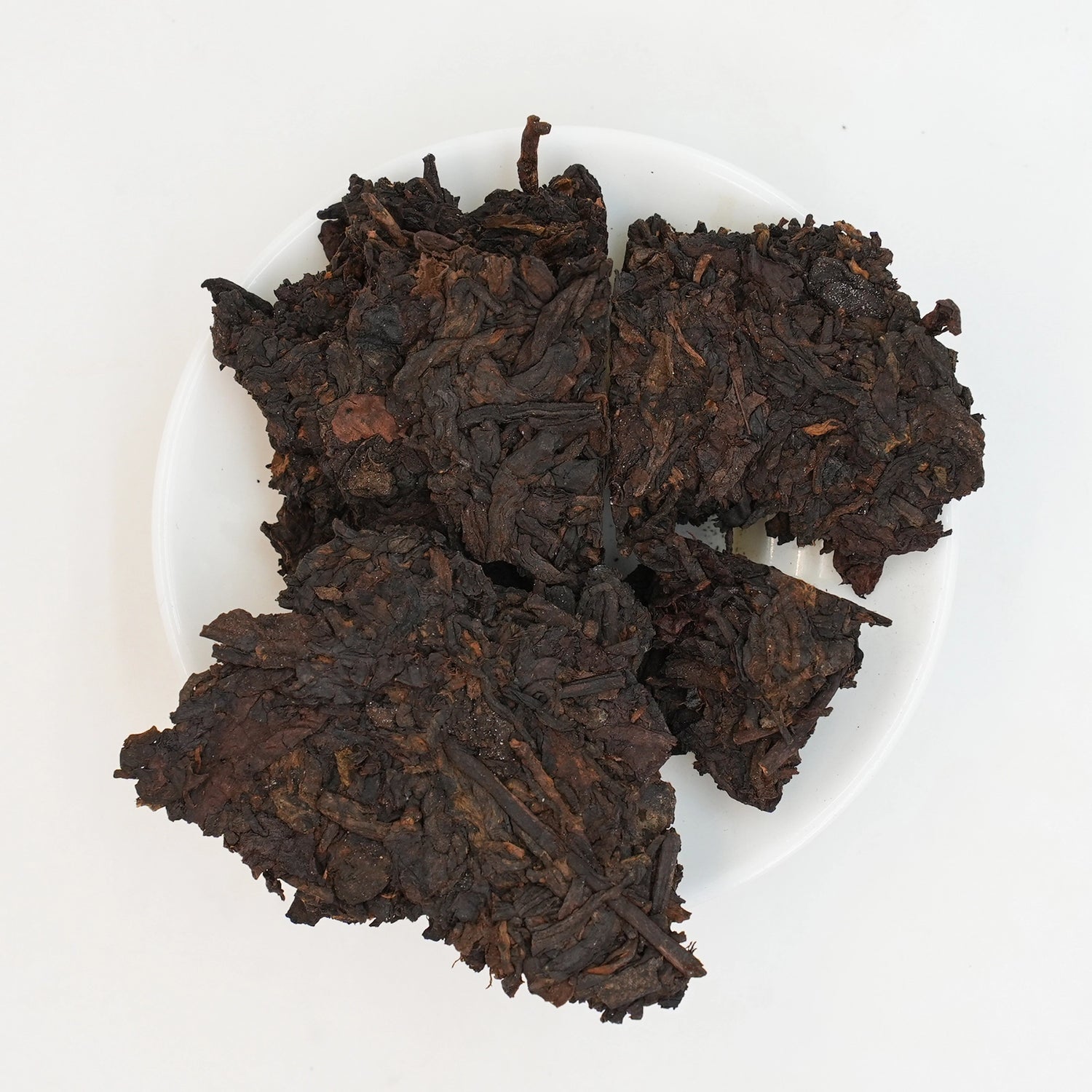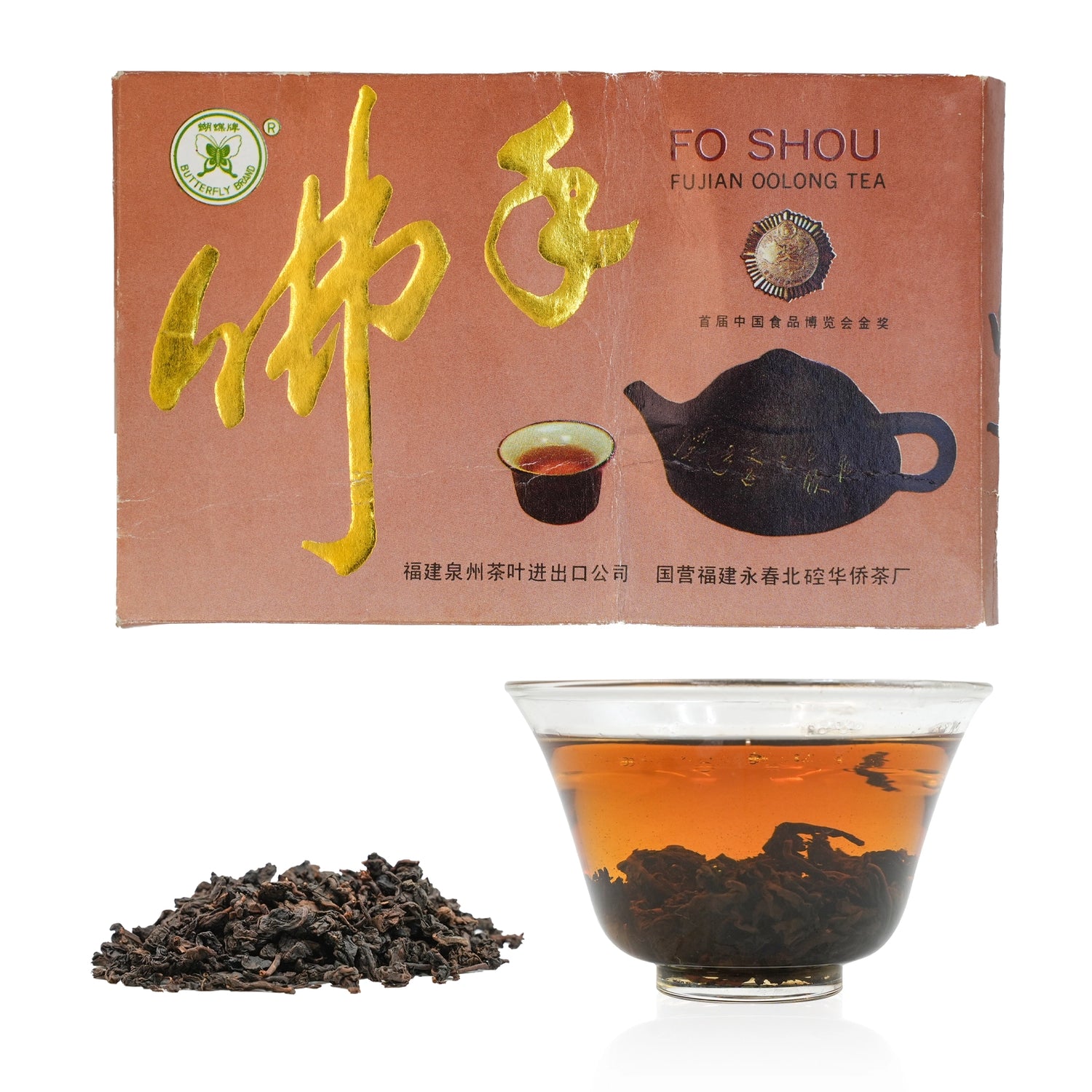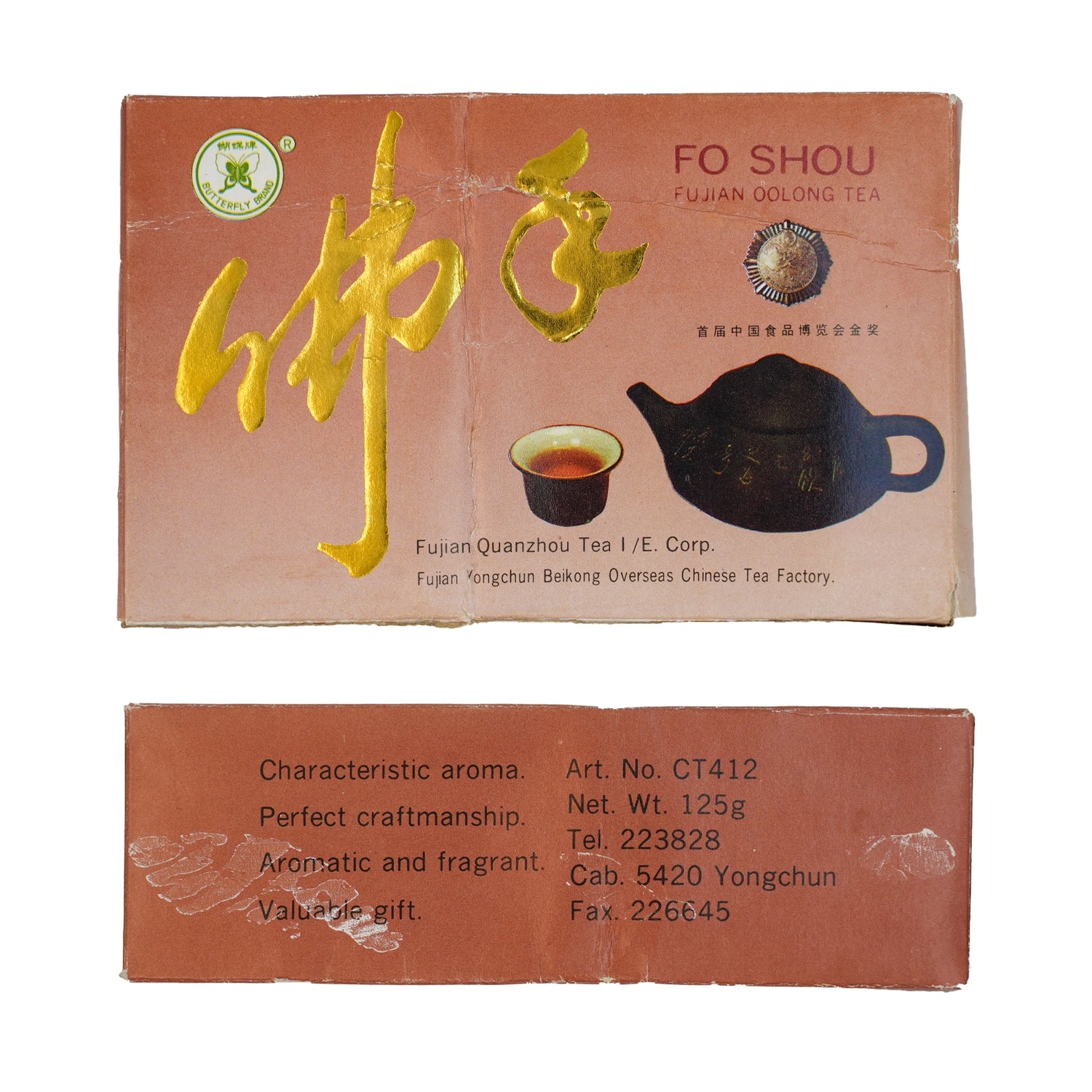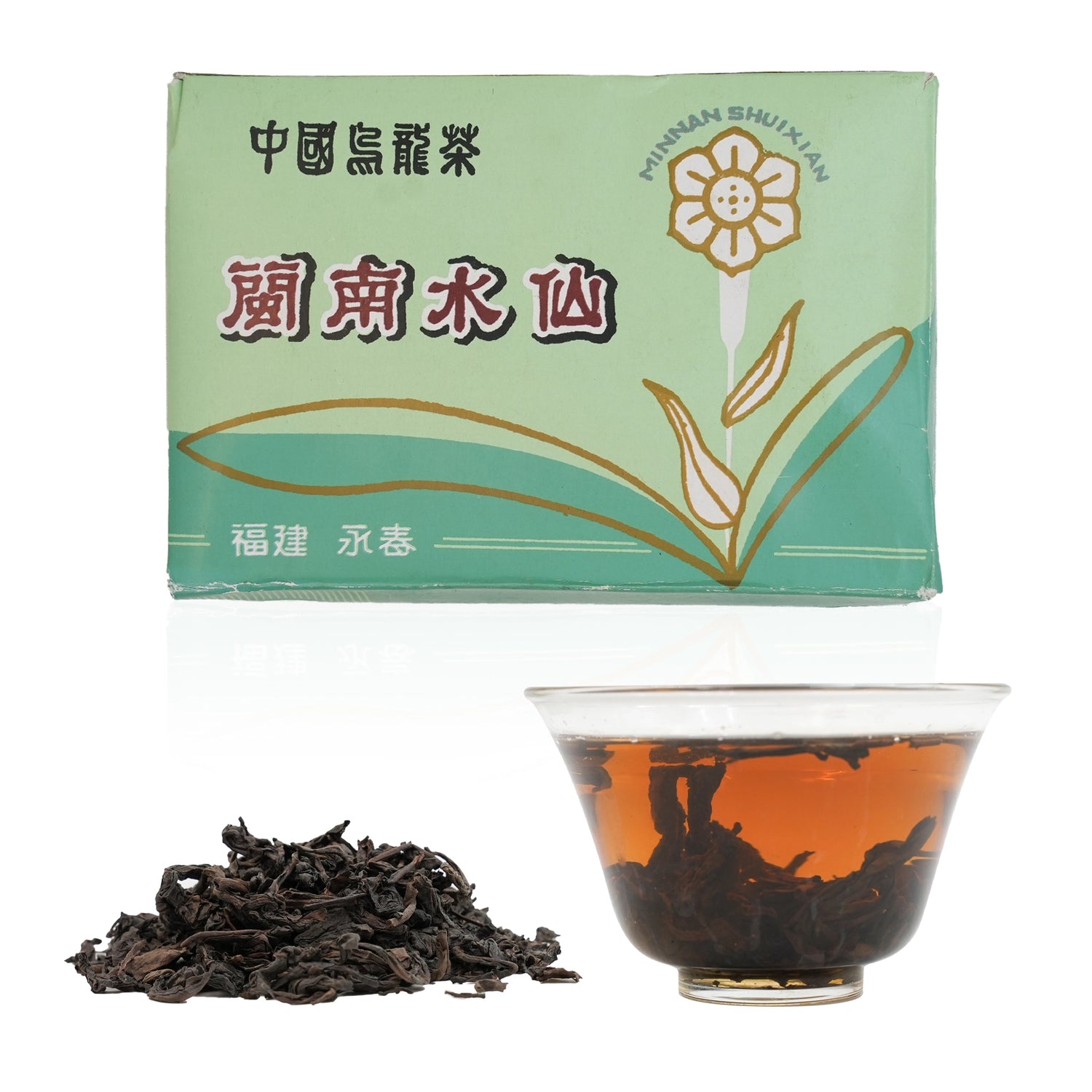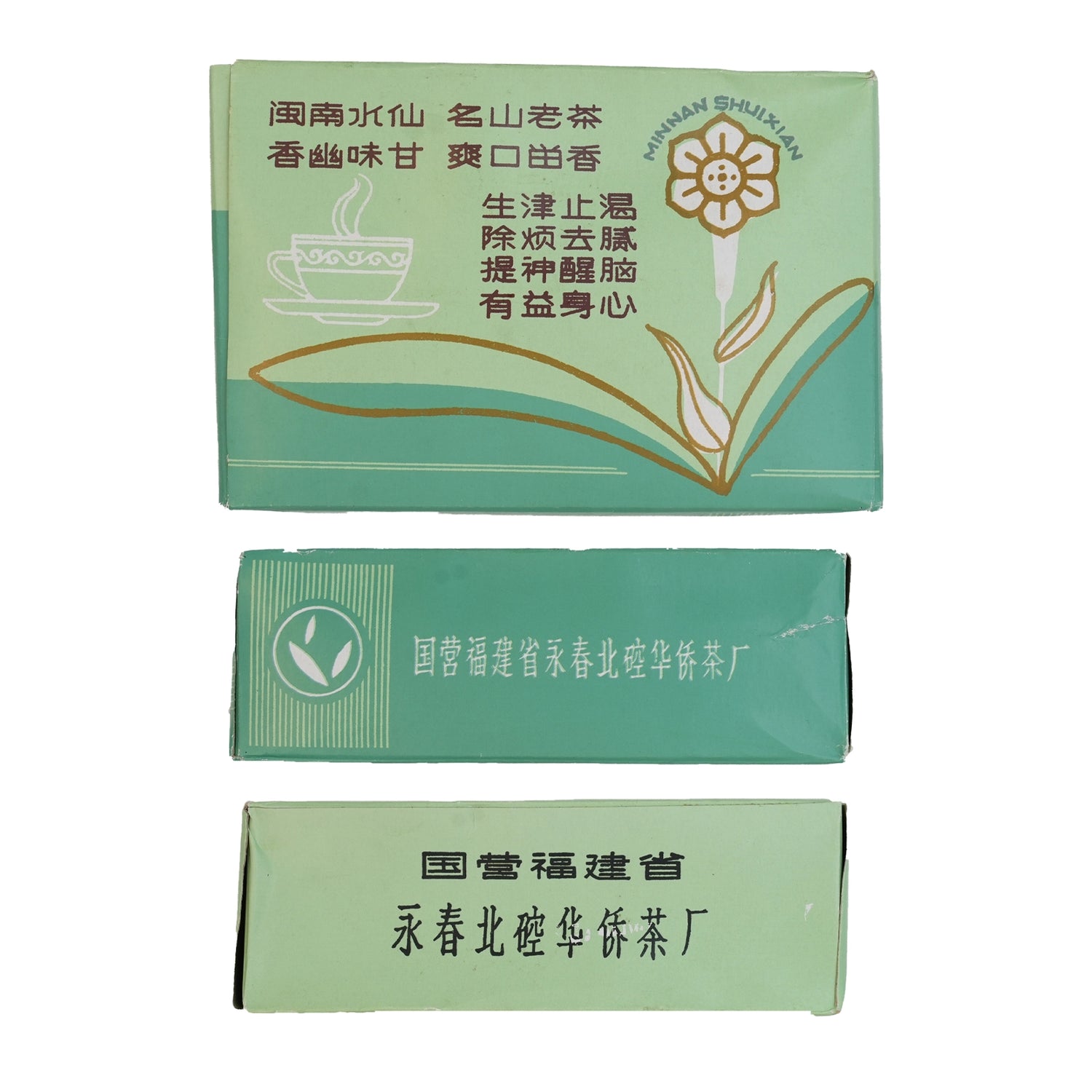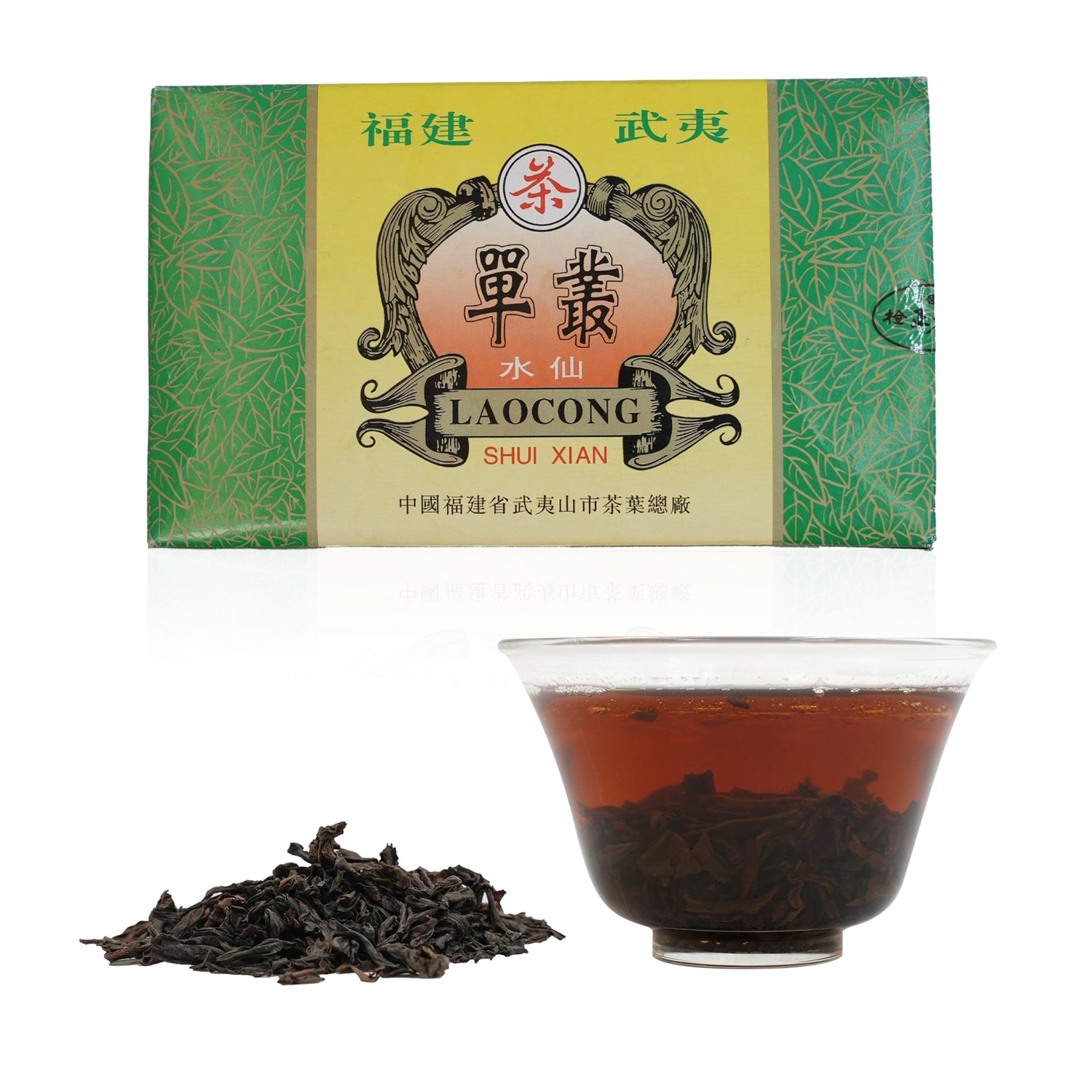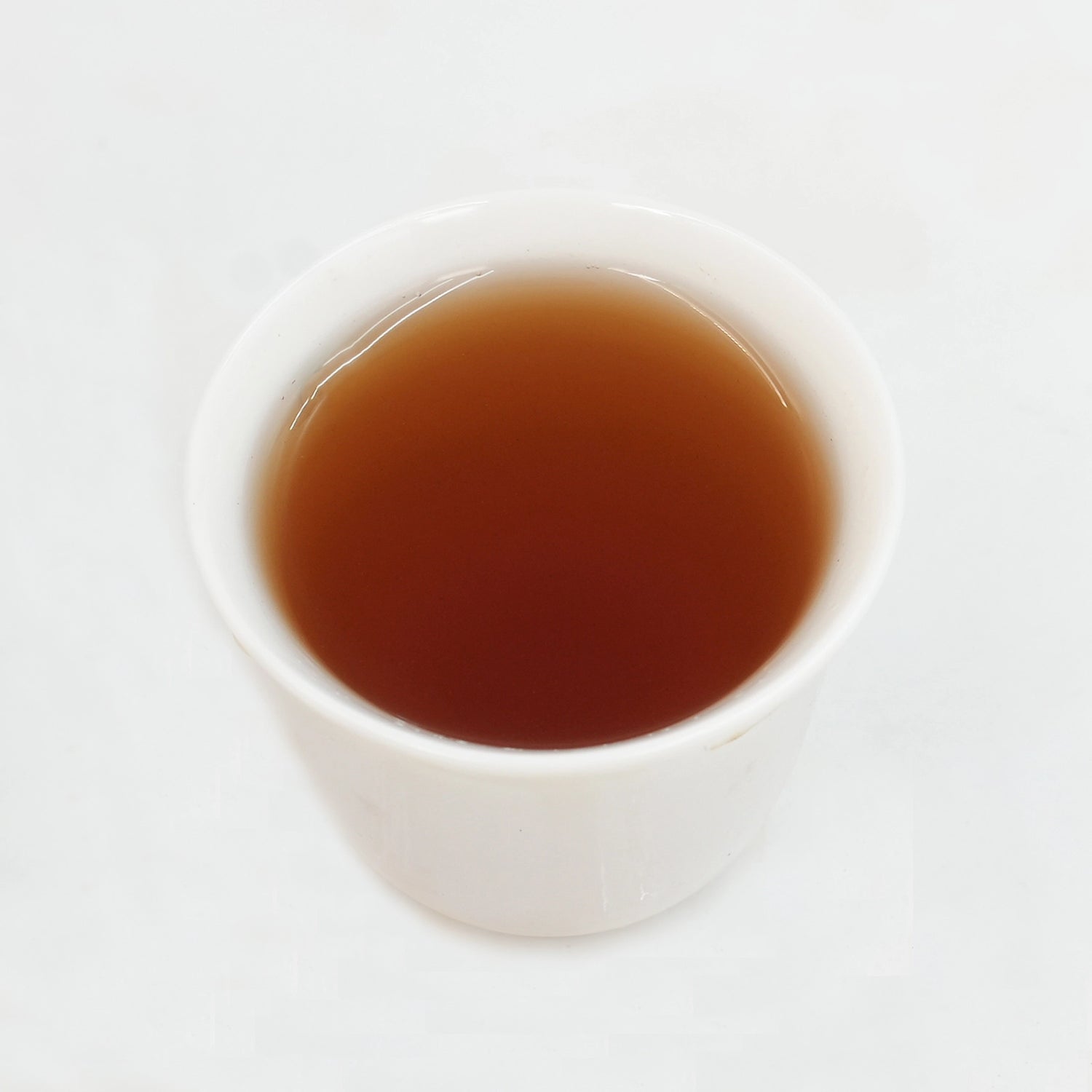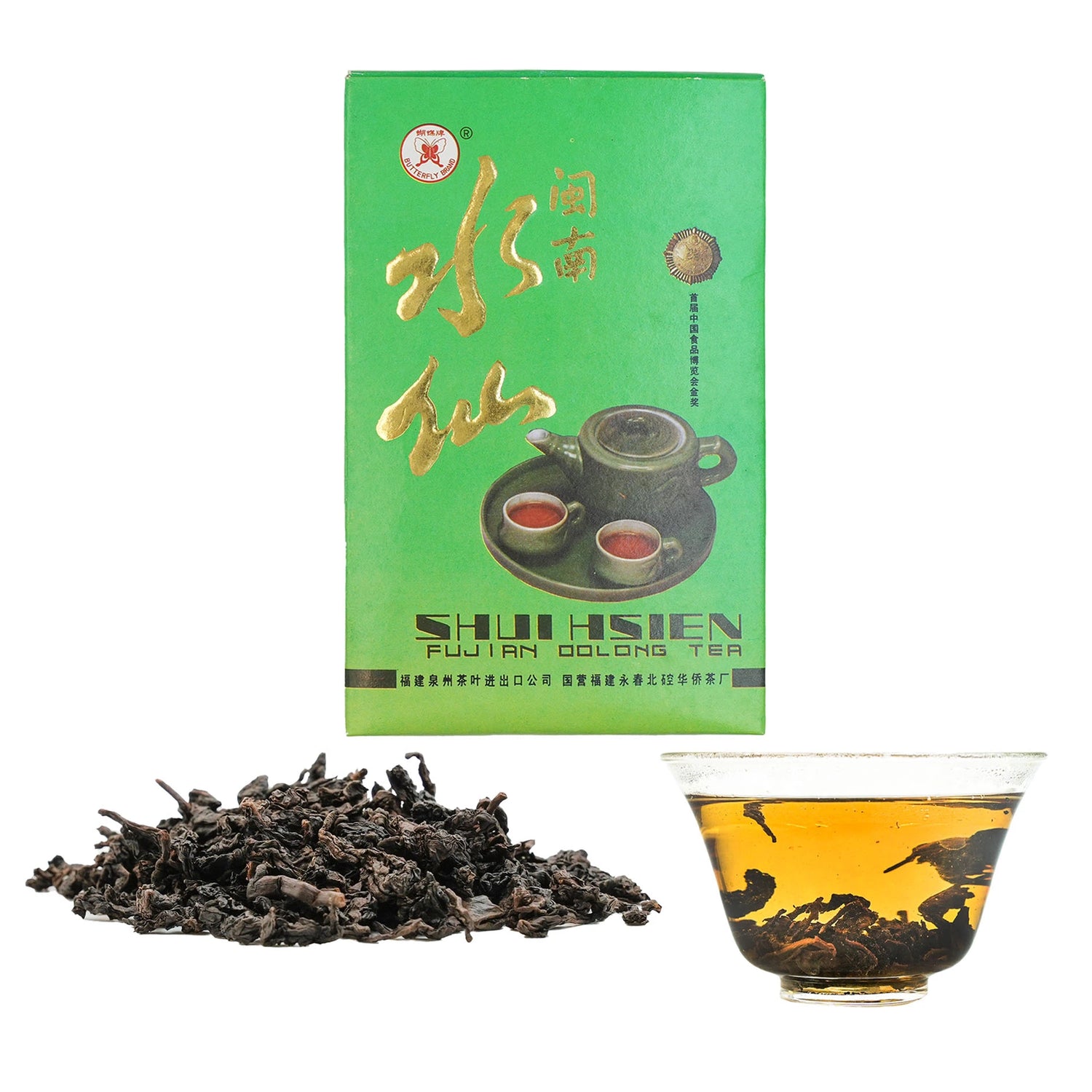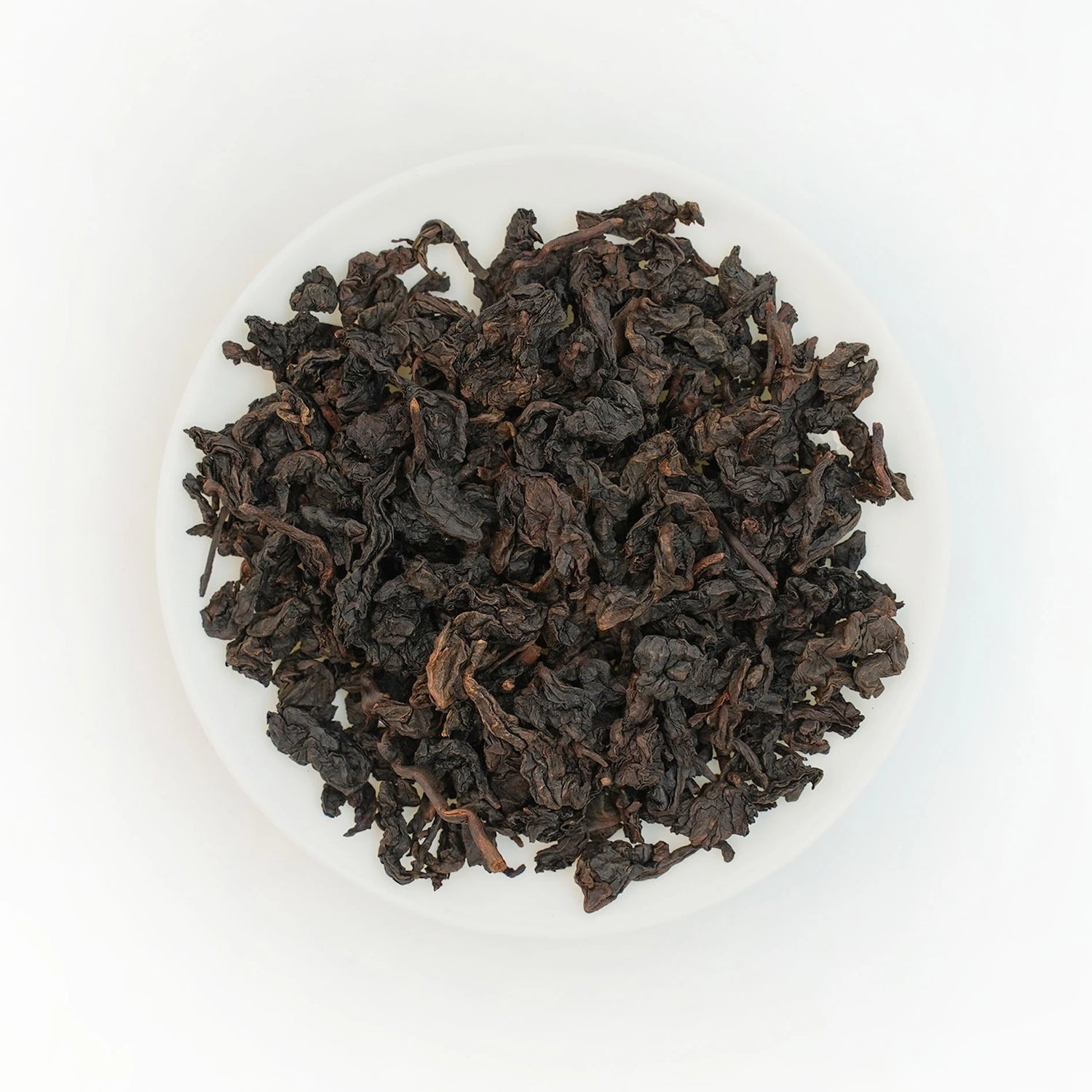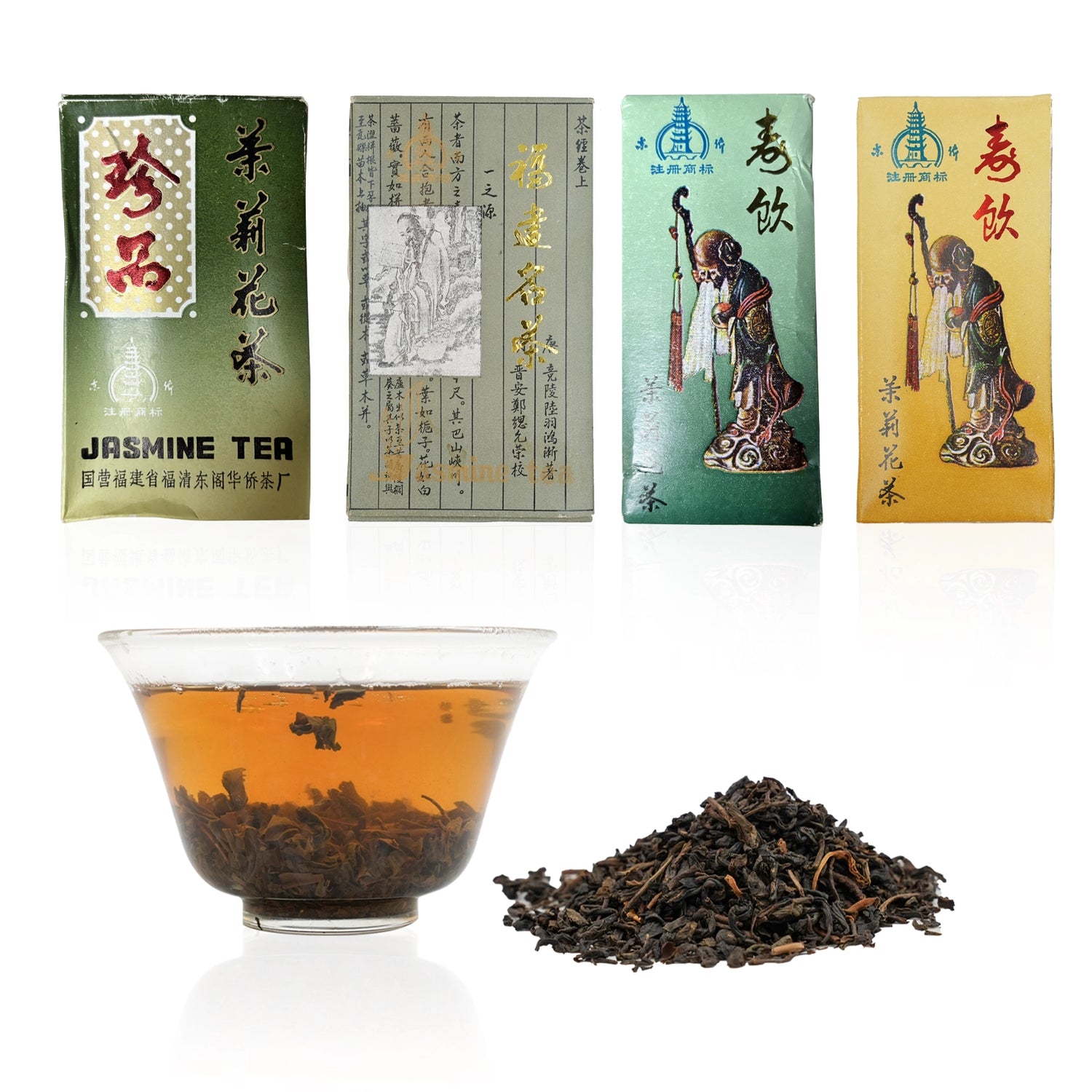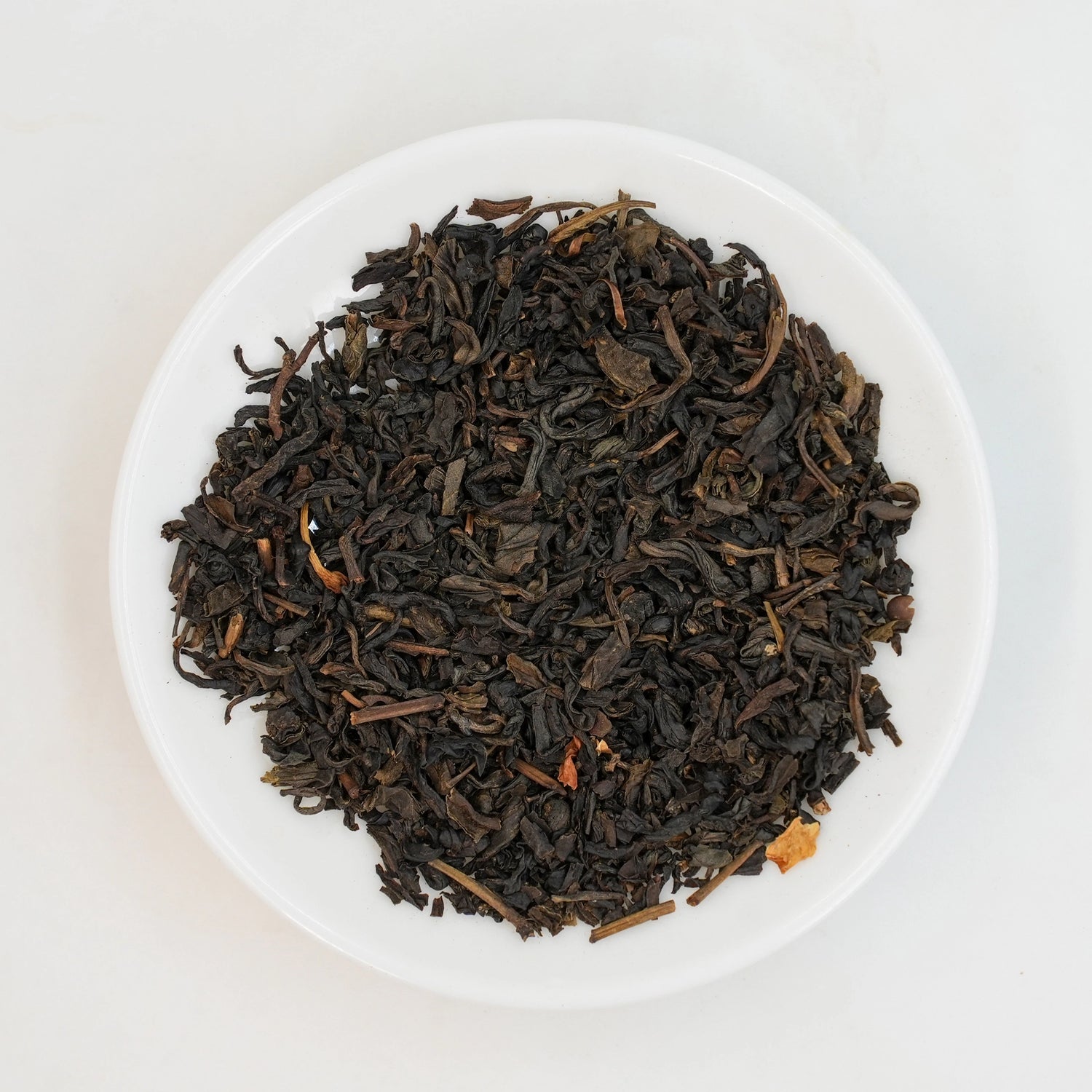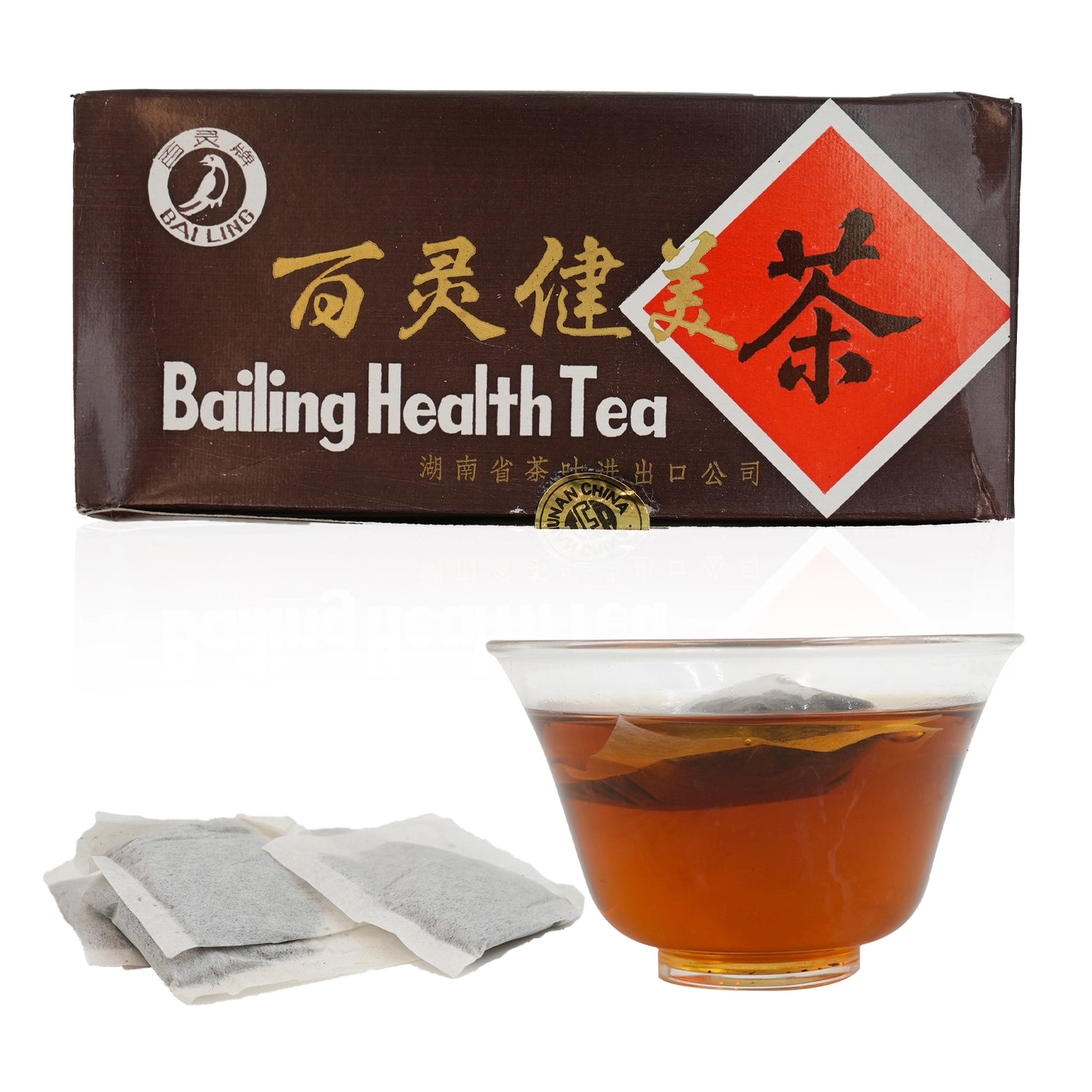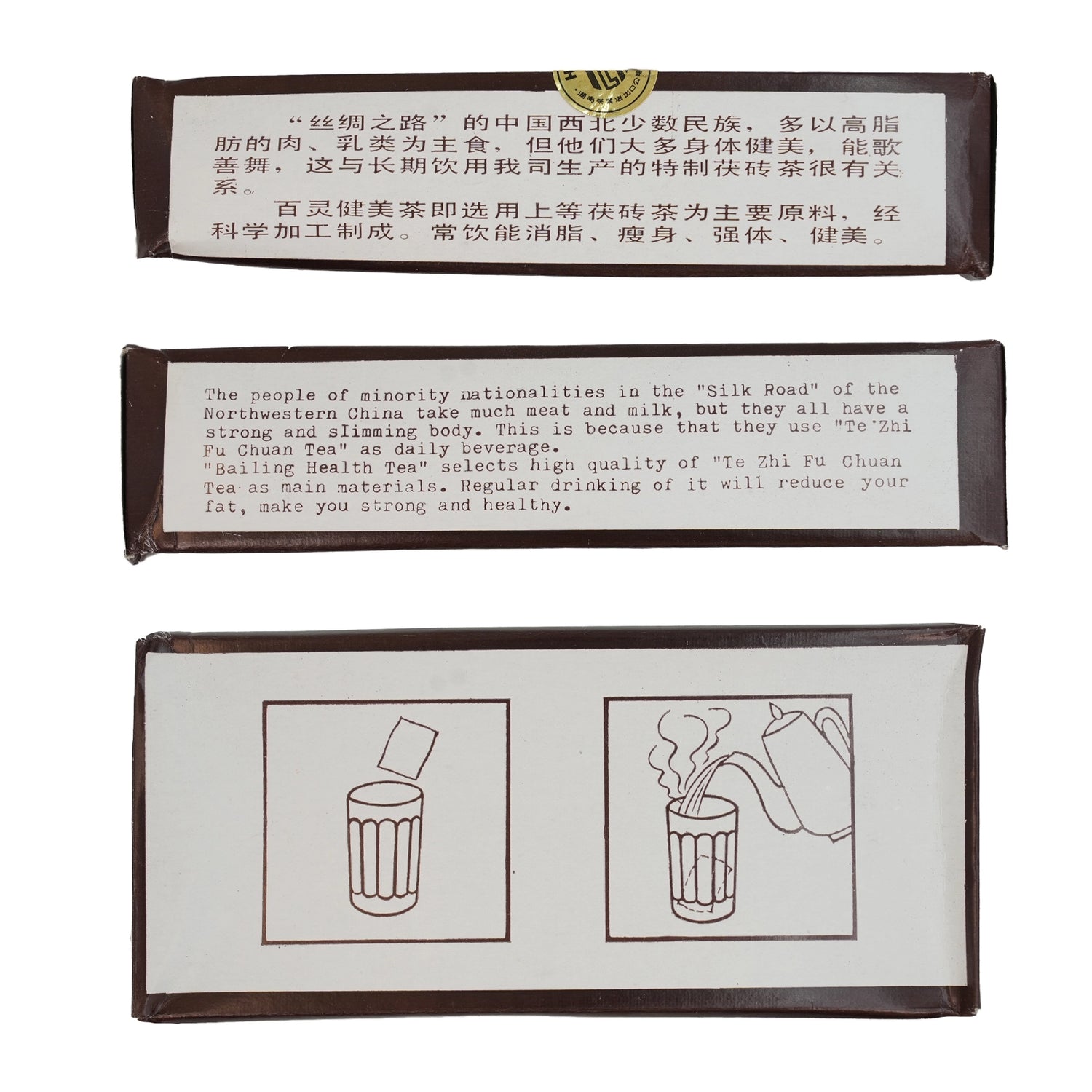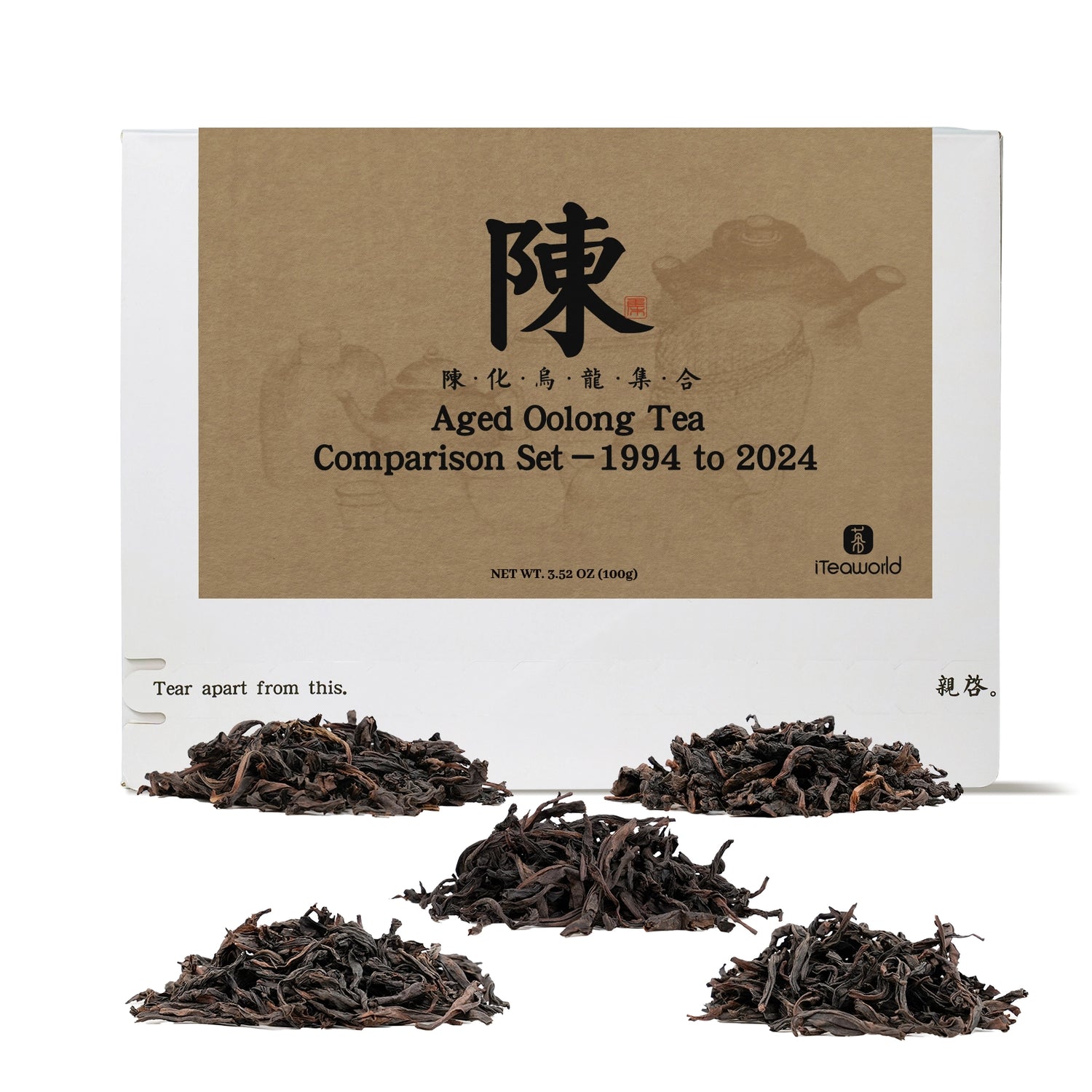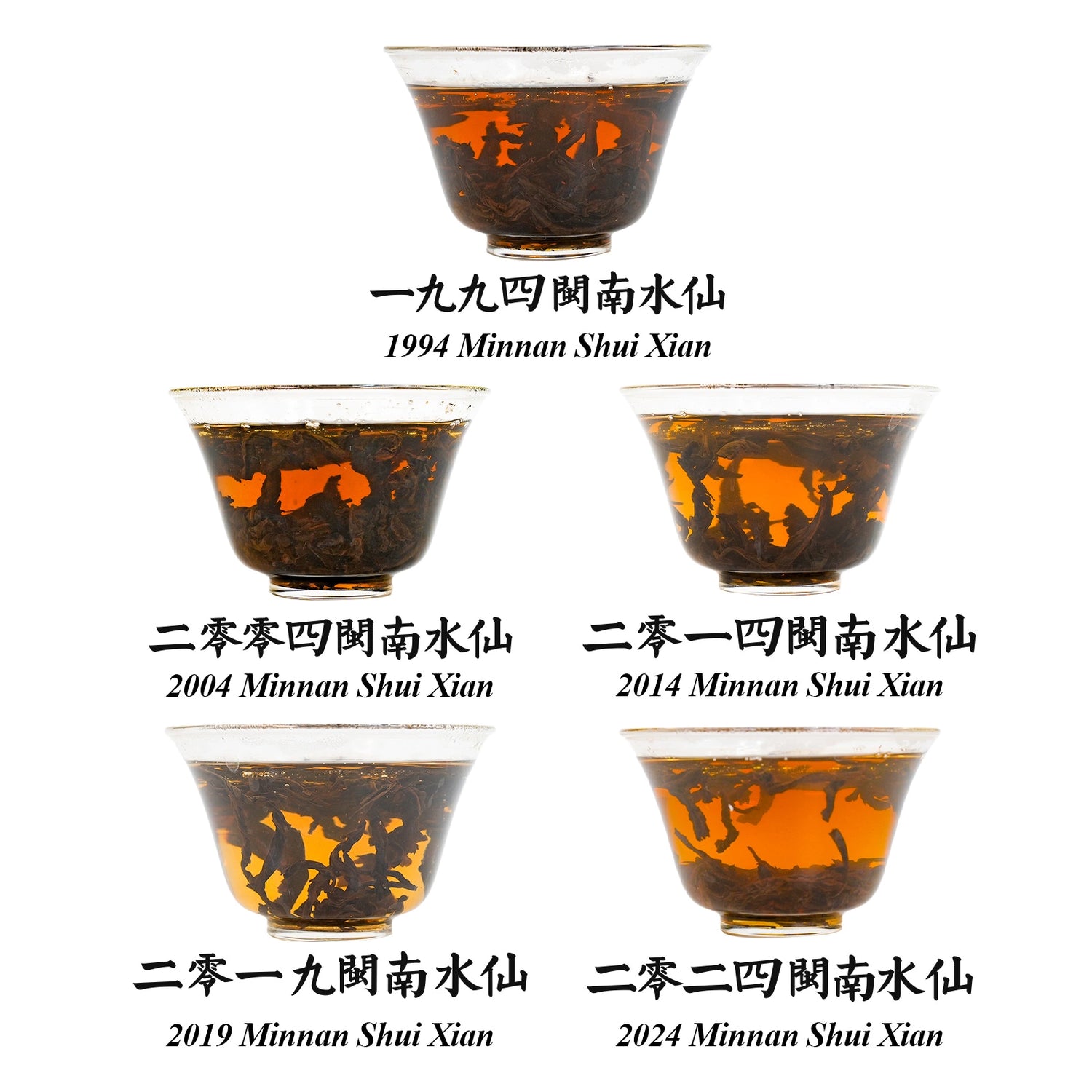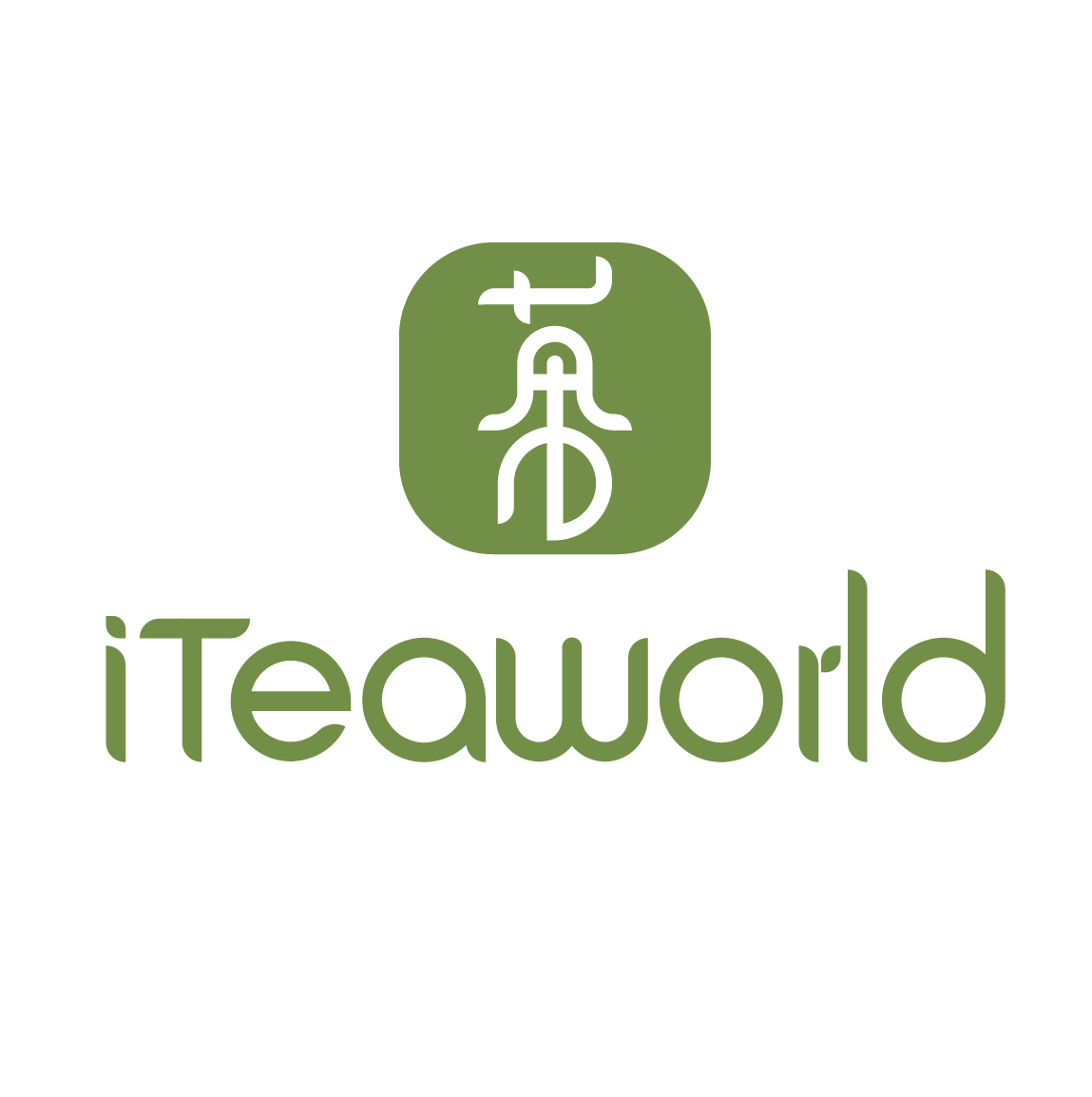Сортировать по:
16 продуктов
16 продуктов
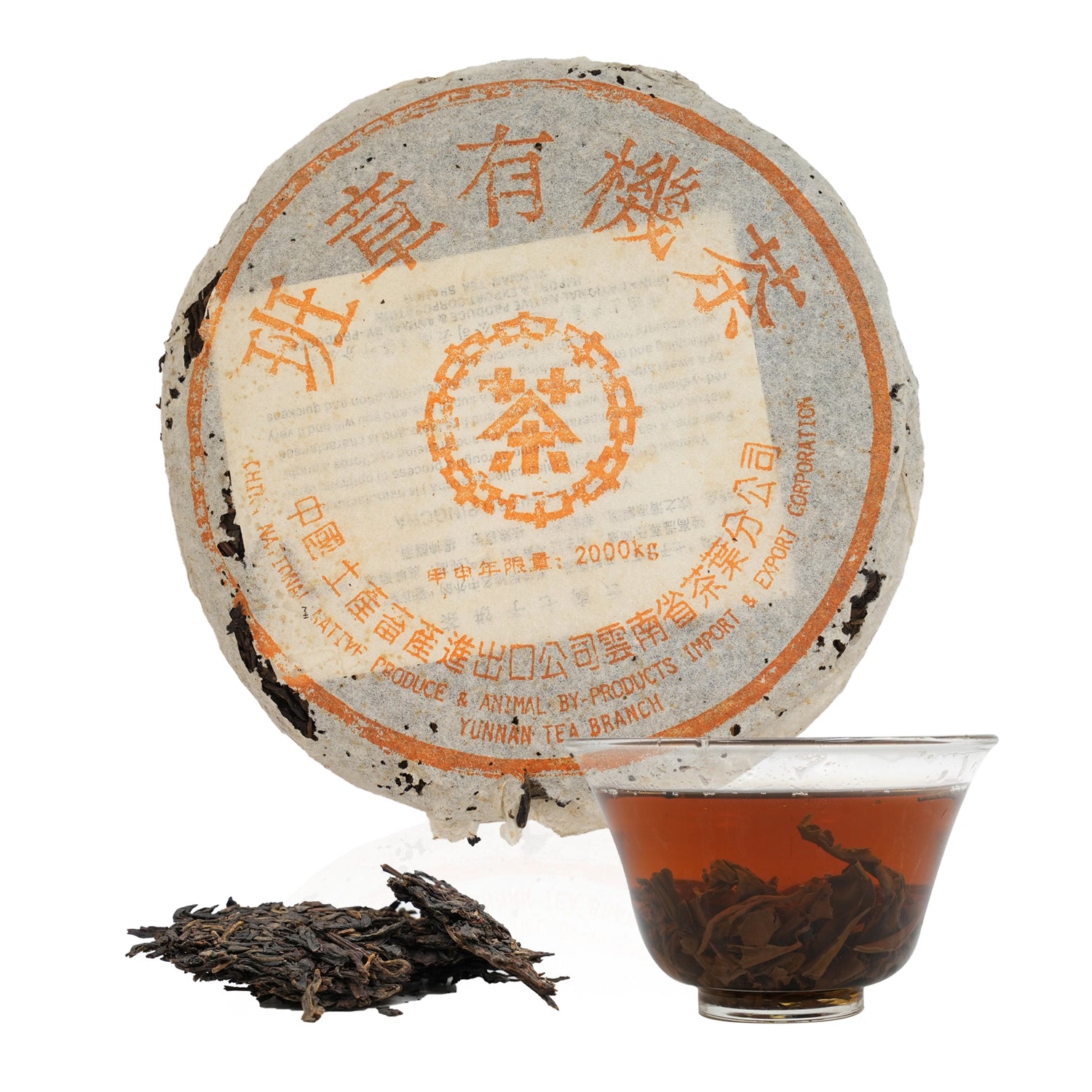

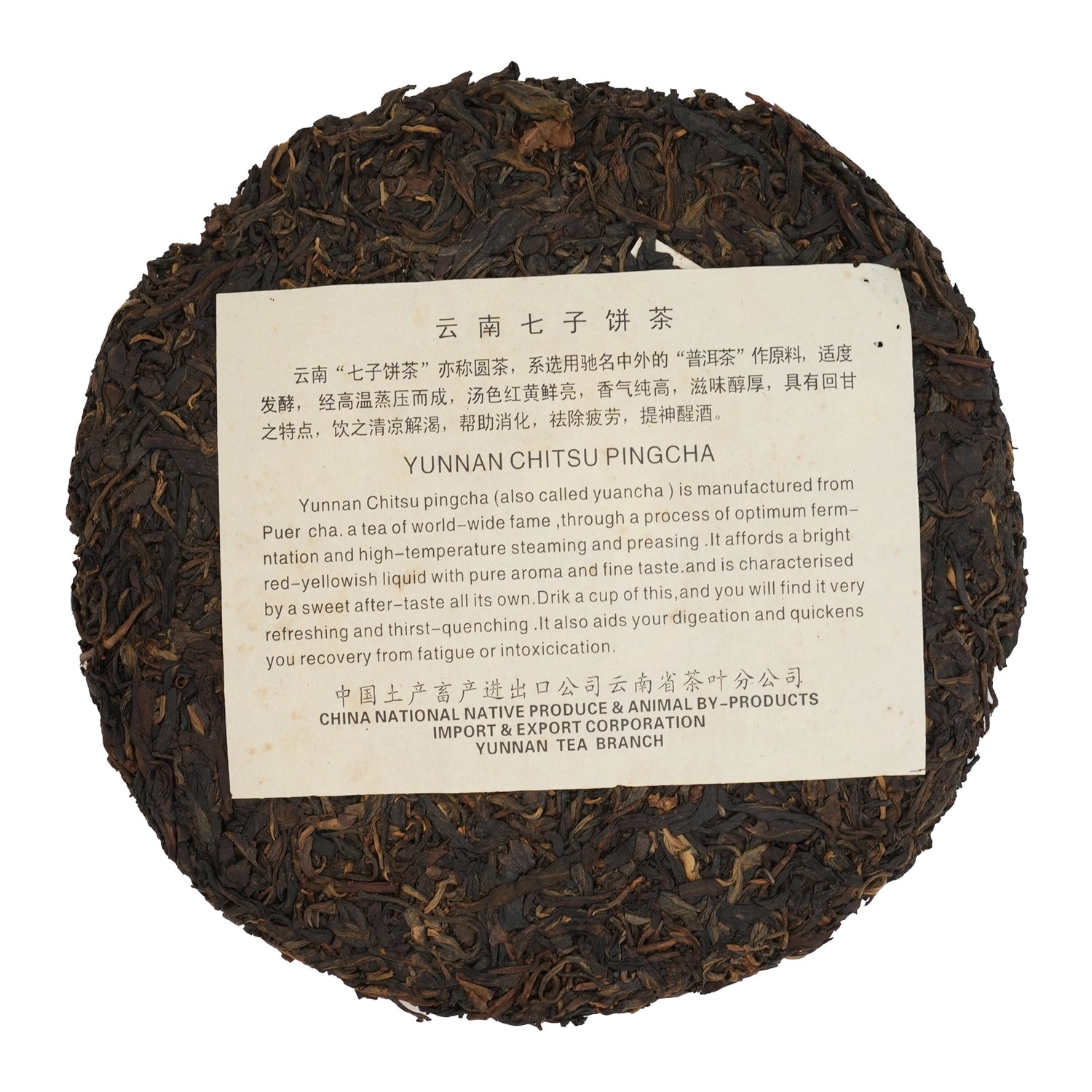
Выдержанный чай - прессованный чай Yunnan Qi Zi, сырой чай Pu-erh 2004 года
$99.99 USD
Цена за единицу товара заВыдержанный чай - прессованный чай Yunnan Qi Zi, сырой чай Pu-erh 2004 года
$99.99 USD
Цена за единицу товара заВ процессе выдержки и транспортировки выдержанного чая упаковка и сам чай могут быть повреждены. Пожалуйста, будьте осторожны при покупке, если вас это беспокоит.
Рекомендуемая покупка
Этот чай Yunnan Qi Zi Bing 2004 года — традиционный чай пуэр, изготовленный из чайных листьев, собранных летом на известных органических чайных плантациях Ban Zhang в провинции Юньнань. Известный своим глубоким, богатым вкусовым профилем, этот чай подвергается умеренной ферментации, пропаривается и прессуется в круглую форму. С ярким оранжево-красным настоем и отчетливым ароматом камфоры этот чай имеет насыщенный, мягкий вкус с сохраняющейся сладостью. По мере старения чая горькие и вяжущие ноты исчезают, оставляя освежающее, охлаждающее послевкусие, которое идеально подходит для пищеварения и омоложения. Этот чай идеально подходит для тех, кто ценит смелые характеристики чая пуэр и особый вкус Ban Zhang. Этот продукт остается в своей оригинальной упаковке и больше не доступен на рынке.
Основные сведения о чае «Юньнань Ци Цзы Бин»
- Происхождение: Юньнань, Китай
- Дата производства: 2004
- Класс: Второй класс
- Сорт чая: Юньнаньский крупнолистовой
- Мастерство: Умеренно ферментированный, затем пропаренный и спрессованный в круглые лепешки.
- Особенности вкуса: камфорный аромат, сильная, но быстро исчезающая горечь, прозрачный оранжево-красный напиток с длительной сладостью.
- Хранение: Естественное хранение в Дунгуане при небольшой влажности, без посторонних привкусов.
Что такое чай «Юньнань Ци Цзы Бин»?
Чай Yunnan Qi Zi Bing, также известный как «круглый чай», представляет собой особый тип прессованного чая пуэр, изготовленного из высококачественных листьев из знаменитых чайных садов Ban Zhang в Юньнани. Известный своим крепким, насыщенным вкусом, чай проходит тщательную ферментацию и пропаривание перед прессованием в круглые лепешки, что позволяет вкусам раскрываться с течением времени. Его мягкий, слегка горьковатый вкус трансформируется со временем, раскрывая богатый, мягкий характер. По мере того, как он продолжает стареть, этот чай становится все более мягким и сбалансированным, с заметным охлаждающим и освежающим послевкусием.
Рекомендуемые методы заваривания
-
Гайвань Пивоварение
- 100мл Гайвань
- 95 ℃ -100 ℃
- 5-7 раз
- 1:15 - 1:25 |
- 10~20 секунд
-
Термос для заваривания
- 1 г чая на 100 мл (3,4 унции) воды
- Используйте кипящую воду (212 ° F)
- Время настаивания: 1-2 часа
- Инструмент: Термос с изоляцией
-
Метод кипячения
- Добавьте 1 г чая на 100 мл (3,4 унции) воды.
- Кипятить 1-2 минуты, затем дать постоять 2-3 минуты.
- Для каждой дополнительной заварки увеличивайте время кипячения на 3 минуты.
- Для лучшего вкуса рекомендуется использовать керамический или стеклянный чайник.
- Наслаждайтесь 3-4 порциями кофе
Правила хранения
Храните этот чай в хорошо проветриваемом, сухом помещении с уровнем влажности ниже 45% и температурой ниже 25 ° C (77 ° F). Берегите его от сильных запахов, света и воздействия воздуха. Правильное хранение гарантирует, что чай сохранит свой вкус и продолжит изящно стареть с течением времени.
Вес и упаковка
Вес нетто: 357 г (12,6 унций)
Тип упаковки: В бумажной обертке
О происхождении чая
Этот чай Yunnan Qi Zi Bing Tea поставляется из высококачественных чайных садов Ban Zhang, которые славятся производством некоторых из лучших чаев пуэр. Расположенный в южной части Юньнани, регион Ban Zhang имеет долгую историю выращивания чая, и его листья ценятся за их крепкий вкус и способность хорошо вызревать с течением времени. Чай тщательно производится компанией Yunnan Tea Import and Export Company, которая известна своей приверженностью высоким стандартам в производстве чая.
Рекомендуемая покупка
Ключевые сведения о сыром чае Yiwu Cake
- Происхождение: Иу, провинция Юньнань, Китай.
- Дата производства: 2010
- Класс: Первый класс
- Сорт чая: Юньнаньский крупнолистовой сорт
- Мастерство: Этот чай производится из высушенных на солнце сырых чайных листьев крупнолистового сорта Юньнань, обработанных традиционными методами, включая завяливание, скручивание, разминание, прессование и высокотемпературную обработку паром, для создания очищенного продукта. Затем он естественным образом выдерживается в сухой среде хранения в течение 15 лет, что позволяет ему развить свой уникальный характер и глубину.
- Особенности вкуса: чай обладает сильным, стойким ароматом, богатым и мягким вкусом, сладким и освежающим послевкусием, а также отличной стойкостью для многократного заваривания.
Что такое сыроедческий чай Иу?
Чай Yiwu Raw Cake — классический шедевр в мире чая пуэр. Он изготавливается из высушенных на солнце сырых чайных листьев, собранных с экологически чистых чайных деревьев в чайном регионе Иу в начале весеннего сезона, из сырья, полученного из лучших районов выращивания. Чайный блин имеет цвет от темно-зеленого до черного, с умеренным уровнем сжатия, четко видимыми чайными нитями и толстым, мягким и равномерно ярким заваренным листом.
Чай Yiwu Raw Cake Tea наследует поколения традиционного мастерства приготовления чая, сочетая в себе нежный, но крепкий характер с потенциалом улучшения с возрастом, становясь все более ароматным с течением времени. Это вечная классика, сформированная как течением времени, так и преданностью искусных мастеров чайного дела.
Советы по завариванию и наслаждению
Этот чай воплощает в себе уникальную трансформацию, которую приносит время. Первый настой может служить «пробуждением чая», чтобы активировать внутренние качества чая, усиливая его богатый и мягкий вкус. Для лучшего опыта рекомендуется использовать традиционные методы заваривания, чтобы полностью раскрыть его выдержанные характеристики.
Рекомендуемые методы заваривания
Гайвань Пивоварение
- Емкость: 100 мл Гайвань
- Вода: минеральная вода или очищенная вода
- Температура воды: 100℃
- Время заваривания: 7-8 раз
- Соотношение чая и воды: около 7:100 (регулируйте по своему вкусу)
- Время заваривания один раз: около 5 секунд (регулируйте по своему вкусу). Рекомендуется вылить первые два настоя и начать пить с третьего настоя.
Правила хранения
Чтобы обеспечить наилучшее качество чая, идеальный способ хранения — хранить его в вакуумной упаковке в прохладном, темном и сухом месте. Избегайте воздействия сильных запахов и воздуха. Для герметичного хранения рекомендуется использовать жестяную банку или металлическую банку с двойной крышкой. Для еще лучшего результата вы можете хранить герметично закрытый чай в холодильнике или сухом контейнере для хранения.
Вес и упаковка
Вес: 12,6 унций (357 г)
Тип упаковки: Бумажная упаковка
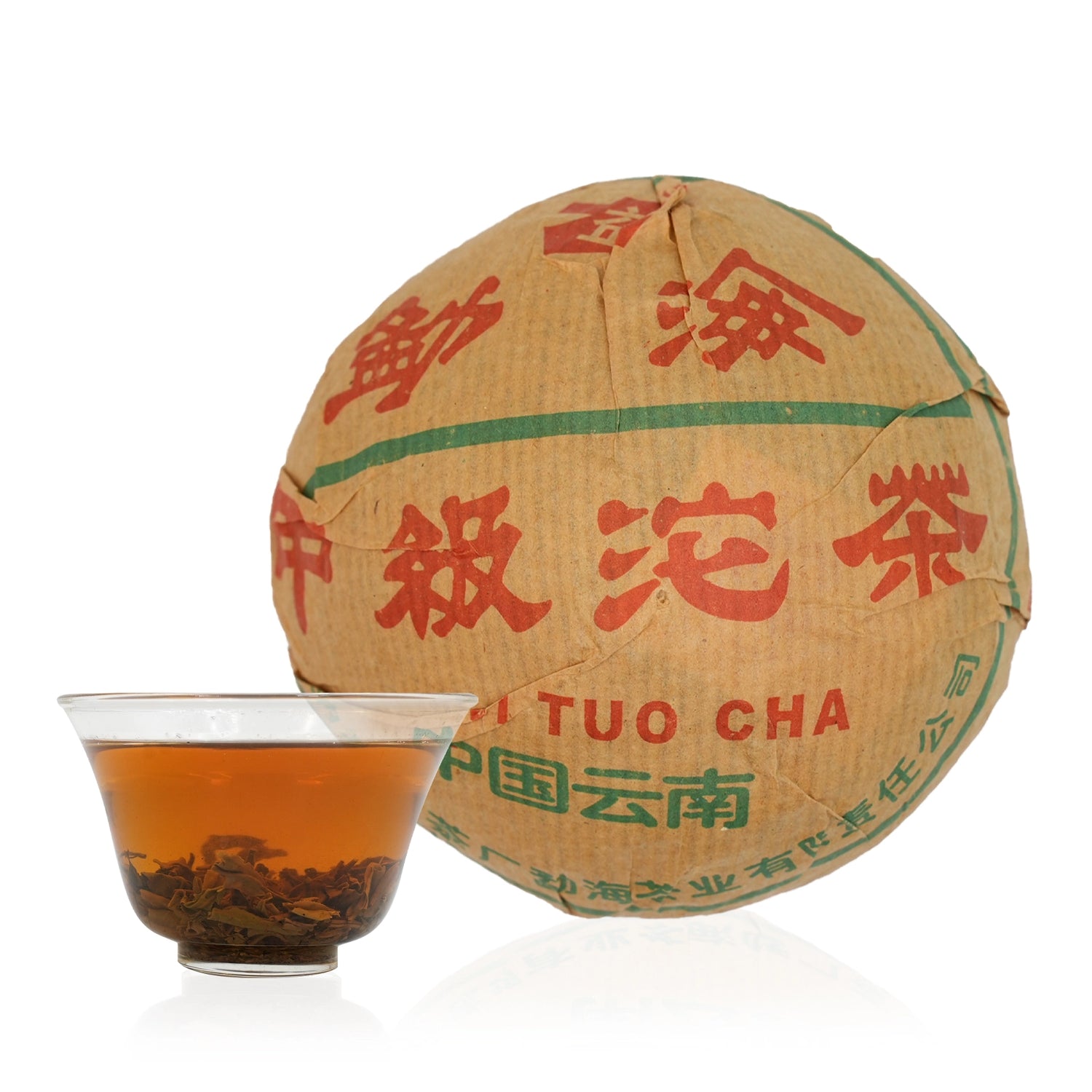
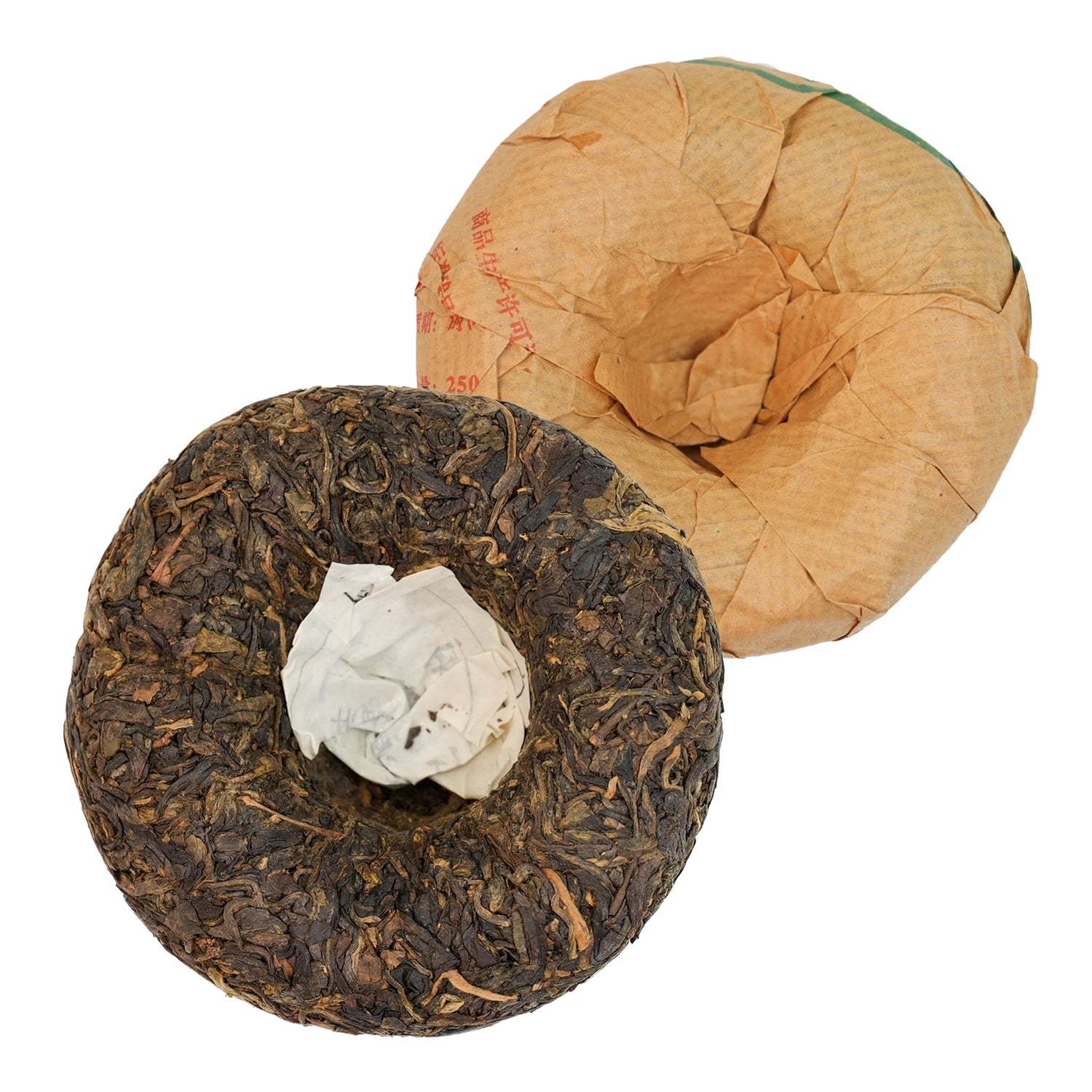
Выдержанный чай - чай Пуэр Туо из провинции Юньнань 2003 года
От $59.99 USD
Цена за единицу товара заВыдержанный чай - чай Пуэр Туо из провинции Юньнань 2003 года
От $59.99 USD
Цена за единицу товара заРекомендуемая покупка
Этот чай Yunnan Pu'er Tuo, произведенный в 2003 году и выдержанный в течение 22 лет на сухом северном складе, изготовлен из сортов крупнолистового чая Yunnan, собранных в основных районах выращивания чая в регионе. Это премиальный чай Tuo, произведенный на фабрике Menghai Tea Factory в провинции Юньнань, известной своим изысканным выбором материалов и скрупулезным мастерством. Этот чай больше не доступен на рынке.
Чай имеет уникальный вид чаши, с отчетливым выдержанным ароматом и богатым, сложным профилем. Его вкус мягкий, освежающий и гладкий, со сладкой, бархатистой текстурой и длительным послевкусием. Этот редкий и очень востребованный чай является классическим ранним шедевром Даи (Мэнхай), который ценят как коллекционеры, так и ценители.
Основные сведения о чае «Юньнань Пуэр Туо» 2003 года
- Происхождение: Сишуанбаньна, провинция Юньнань, Китай.
- Дата производства: 2003 г.
- Класс: Первый класс
- Сорт чая: Юньнаньский крупнолистовой сорт
- Мастерство:Используя собранные вручную чайные листья в качестве сырья, свежие листья обрабатываются путем завяливания, фиксации, скручивания и сушки на солнце для создания высушенного на солнце чая. Высушенный на солнце чай затем пропаривается и прессуется в форму чая Пуэр То. Наконец, чай проходит 22 года естественной выдержки в сухой среде хранения, что позволяет ему развить свой уникальный характер и глубину.
- Вкусовые особенности: Чай демонстрирует отчетливый выдержанный аромат с богатым и сложным профилем. Его вкус мягкий, освежающий и гладкий, с бархатистой текстурой, высокой сладостью и длительным послевкусием.
Что такое чай «Юньнаньский Пуэр То»?
Чай Пуэр Туо из Юньнаня — традиционный и самобытный чай из провинции Юньнань, известный своей уникальной формой, напоминающей толстостенную чашу с вогнутым центром. Он плотно спрессован и аккуратно сформирован, изготовлен из чая Пуэр в качестве сырья.
Темный чай Туо делится на два вида:
Сырой Туо (Шэн Туо): прессуется непосредственно из высушенных на солнце сырых чайных листьев, отличается темным, глянцевым цветом, свежим ароматом и сладким послевкусием.
Зрелый Туо (Шоу Туо): ферментируется методом искусственной ферментации в кучах, в результате чего получается красновато-коричневый цвет и насыщенный, мягкий вкус.
Чай Пуэр Туо имеет долгую историю, записи о нем датируются династией Мин в книге «Дянь Люэ». В 1986 году 100-граммовый чай Туо, произведенный на чайной фабрике Юньнань Сягуань, получил премию «Золотой петух» в Париже, Франция.Современные исследования подтвердили его значительную пользу для здоровья. Клинические испытания французских и китайских медицинских учреждений показали, что он может снижать уровень липидов и холестерина в крови, а также помогать в лечении ожирения, гипертонии и атеросклероза.Настой чая известен своим стойким цветом, ароматом и вкусом, сочетающим культурное наследие со свойствами, способствующими укреплению здоровья. Он получил международное признание за свои уникальные качества.
Советы по завариванию и наслаждению
Этот чай воплощает в себе уникальную трансформацию, привнесенную временем. Первое заваривание может служить «пробуждением чая», чтобы активировать внутренние качества чая, усиливая его вкусовой профиль. Чай Туо — это тип прессованного чая. Перед завариванием используйте специальный чайный нож или лопатку, чтобы аккуратно разломить чай Туо на кусочки подходящего размера. Избегайте применения чрезмерной силы, чтобы не повредить чайные листья.
Рекомендуемые методы заваривания
- Емкость: 100 мл Гайвань
- Температура воды: 90-100℃
- Время заваривания: 7-8 раз
- Соотношение чая и воды: около 1:20 (регулируйте по своему вкусу)
- Время заваривания один раз: 10-20 секунд (регулируйте по своему вкусу). Первый раз в качестве пробуждающего чая может занять 3 секунды.
Правила хранения
Чтобы обеспечить наилучшее качество чая, идеальный способ хранения — хранить его в вакуумной упаковке в прохладном, темном и сухом месте. Избегайте воздействия сильных запахов и воздуха. Для герметичного хранения рекомендуется использовать жестяную банку или металлическую банку с двойной крышкой. Для еще лучшего результата вы можете хранить герметично закрытый чай в холодильнике или сухом контейнере для хранения.
Вес и упаковка
Вес: 3,5 унции (100 г)/8,8 унции (250 г)
Тип упаковки: Упаковка из крафт-бумаги
О Мэнхайской чайной фабрике
Menghai Tea Factory — это образцовое предприятие в индустрии чая пуэр. Основанная в 1940 году в уезде Мэнхай, Сишуанбаньна, Юньнань — родине чайных деревьев и основном регионе производства чая пуэр — она является старейшей профессиональной чайной компанией в Юньнани. Фабрика объединяет выращивание, обработку и продажу, а ее флагманский бренд «Dayi» предлагает сотни сортов, включая чай пуэр, черный чай и зеленый чай. Ее репрезентативная продукция, 7572 Ripe Cake и 7542 Raw Cake, широко признана золотым стандартом качества чая пуэр.
Фабрика внесла выдающийся вклад в современное развитие чая Пуэр: она была пионером и первой применила технологию искусственной постферментационной выдержки, что стало инновационным процессом в обработке чая Пуэр. Она также возглавила крупномасштабное производство чая Yunnan Seven Sons Cake Tea, установив классическую форму в отрасли. Сегодня фабрика владеет современным перерабатывающим предприятием площадью 380 акров и двумя экологическими чайными садами площадью 10 000 акров в Бада и горе Буланг, что создает всеобъемлющую цепочку производства.
Благодаря своим глубоким историческим корням и технологическим инновациям, Menghai Tea Factory продолжает лидировать в развитии индустрии чая Pu'er. Ее продукция высоко ценится как для питья, так и для коллекционирования, заслужив всемирное признание потребителей.
В процессе выдержки и транспортировки выдержанного чая упаковка и сам чай могут быть повреждены. Пожалуйста, будьте осторожны при покупке, если вас это беспокоит.
Рекомендуемая покупка
Этот брикет сырого чая пуэр 2007 года Wa Mountain Impression "7751" курируется г-жой Тан Мэй, бывшим старшим инженером и начальником отдела контроля качества чайной фабрики Куньмина. Следуя традиционным рецептам, он отбирает высококачественные высушенные на солнце зеленые материалы с высоких арборовых деревьев в бассейне реки Ланьцан в Юньнани и тщательно обрабатывается и прессуется с использованием оригинальных методов изготовления кирпичей чайной фабрики Куньмина. Чай наследует суть кирпичного чая чайной фабрики Куньмина с однородной и аккуратной формой кирпича, прозрачными и ровными полосками, открытыми почками и волосками, ярким оранжево-желтым цветом супа, свежим и сильным ароматом, мягким и освежающим вкусом и очевидной возвращающейся сладостью и слюноотделением. Это отличный выбор для ежедневного питья и коллекционирования.
Основные сведения о чайном кирпиче Wa Mountain Impression 2007 года
- Происхождение: Чайная фабрика Cangyuan Wa Mountain, провинция Юньнань, Китай
- Дата производства: 2007
- Класс: Второй класс
- Сорт чая: Юньнаньский крупнолистовой чай
- Мастерство: традиционная технология изготовления кирпичей Куньминской чайной фабрики, высушенный на солнце зеленый чай, спрессованный в кирпичи.
- Особенности вкуса: Яркий оранжево-желтый цвет супа, свежий и сильный аромат, мягкий и освежающий вкус, очевидная возвращающаяся сладость и слюнотечение, насыщенный, аутентичный вкус, напоминающий вкус выдержанного необработанного чая примерно 1995 года.
- Хранение: Естественное хранение в Дунгуане с небольшой сухостью, без посторонних привкусов.
Что такое чайный кирпич Wa Mountain Impression?
Wa Mountain Impression Tea Brick — это чайный продукт пуэр, производимый Yunnan Cangyuan Wa Mountain Tea Factory. Чайная фабрика владеет более чем 6000 акрами экологически чистых высокогорных чайных садов, при этом основная база чайных садов расположена в Tuanjie Dazhai, город Yanshuai, уезд Cangyuan, на высоте более 1800 метров. Климат мягкий, осадки обильные, а район окутан облаками и туманом, вдали от загрязнения, что делает его идеальным местом для выращивания чая. Чайная фабрика строго управляет чайными садами в соответствии с техническими спецификациями Международной федерации движения за органическое сельское хозяйство (IFOAM), гарантируя превосходное качество источников чая Wa Mountain Impression.
Рекомендуемые методы заваривания
-
Гайвань Пивоварение
- Соотношение чая и воды: 1:20
- Температура воды: 95 ° С-100 ° С
- Настои: 6-8 раз
- Время заваривания: 10-20 секунд.
-
Термос для заваривания
- Соотношение чая и воды: 1 г на 100 мл воды.
- Температура воды: 100 ° C (кипящая вода)
- Время настаивания: 1-2 часа
- Инструмент: Термос с изоляцией
-
Метод кипячения
- Соотношение чая и воды: 1 г на 100 мл воды.
- Время закипания: 1-2 минуты, затем дайте постоять 2-3 минуты.
- Повторное заваривание: продлите время заваривания на 3 минуты для каждого дополнительного заваривания.
- Подходит для: керамического или стеклянного чайника.
- Время заваривания: 3-4 заваривания
Правила хранения
Чтобы поддерживать оптимальный процесс выдержки чая , храните его в сухом и прохладном месте с влажностью ниже 45% и температурой ниже 25 ° C. Берегите его от сильных запахов, прямого света и воздействия воздуха. Правильное хранение гарантирует, что чай сохранит свой выдержанный аромат и продолжит изящно созревать с течением времени.
Вес и упаковка
- Вес нетто: 250 г (8,8 унций)
- Упаковка: Оригинальная бумажная коробка.
В процессе выдержки и транспортировки выдержанного чая упаковка и сам чай могут быть повреждены. Пожалуйста, будьте осторожны при покупке, если вас это беспокоит.
Рекомендуемая покупка
Этот кирпичный чай пуэр из Юньнаня 1998 года — замечательный продукт, созданный известной компанией Macao Hualian Tea Company. Кирпичный чай был изготовлен по индивидуальному заказу на фабрике Menghai Tea Factory с использованием отборных крупнолистовых листьев чая из Юньнаня. После 29 лет естественного сухого хранения в Дунгуане чай приобрел насыщенный камфарный и выдержанный аромат с мягким, сладким и мягким вкусом. Внешний вид кирпича плоский с четкими краями и углами, однородной толщиной и темно-коричневым цветом. Настой имеет яркий оранжево-желтый оттенок с небольшим осадком. Этот чай — отличный выбор для любителей пуэра и коллекционеров, ищущих выдержанный, высококачественный чай с исторической значимостью.
Основные сведения о кирпичном чае пуэре Юньнань 1998 года
- Происхождение: провинция Юньнань, Китай.
- Дата производства: 1998
- Класс: Второй класс
- Сорт чая: Юньнаньский крупнолистовой чай
- Мастерство: Изготовлено по индивидуальному заказу на фабрике чая Мэнхай для компании Macao Hualian Tea Company; традиционные методы обработки и прессования.
- Особенности вкуса: выраженный камфорный и выдержанный аромат; мягкий, сладкий и мягкий вкус
- Хранение: Естественное хранение на сухом складе в Дунгуане; хорошая сохранность без затхлого запаха.
Что такое кирпичный чай пуэр из Юньнани?
Чай пуэр из Юньнаня в кирпичах — это тип прессованного чая, изготовленного из сортов чая Юньнань с крупными листьями. Чай проходит процесс окисления, во время которого его пропаривают и прессуют в кирпичи для выдержки. Со временем чай приобретает сложные вкусы и ароматы, становясь более мягким и мягким. Чай пуэр в кирпичах высоко ценится за свой потенциал выдержки и часто востребован коллекционерами и любителями чая.
О компании Macao Hualian Tea Company
Macao Hualian Tea Company, основанная в 1965 году г-ном Цзэн Чжихуэем и четырьмя патриотически настроенными зарубежными китайскими партнерами, сыграла ключевую роль в чайной промышленности. Название «Hualian» означает единство зарубежных китайцев в бизнесе. В 1960–1980-х годах компания тесно сотрудничала с Guangdong Tea Import and Export Corporation, выступая в качестве важнейшего канала для экспорта китайского чая на международные рынки. Примечательно, что Hualian обладала эксклюзивными правами единственного дистрибьютора China Tea Import and Export Company в Макао, контролируя более 90% доли местного рынка. Их кирпичи чая пуэр, особенно те, которые производятся в партнерстве с Menghai Tea Factory, ценятся за свое качество и стали желанными предметами среди коллекционеров чая.
Рекомендуемые методы заваривания
-
Гайвань Пивоварение
- 100мл Гайвань
- 95 ℃ -100 ℃
- 5-7 раз
- 1:15 - 1:25
- 10~20 секунд
-
Термос для заваривания
- 1 г чая на 100 мл (3,4 унции) воды
- Используйте кипящую воду (212 ° F)
- Время настаивания: 1-2 часа
- Инструмент: Термос с изоляцией
-
Метод кипячения
- Добавьте 1 г чая на 100 мл (3,4 унции) воды.
- Кипятить 1-2 минуты, затем дать постоять 2-3 минуты.
- Повторно заваривать, кипятя на 3 минуты дольше с каждым завариванием.
- Для оптимального вкуса используйте керамический или стеклянный чайник.
- Наслаждайтесь 3-4 порциями кофе
Правила хранения
Храните этот чай в сухом, прохладном месте с уровнем влажности ниже 45% и температурой ниже 25 ° C (77 ° F). Берегите его от сильных запахов, света и воздействия воздуха. Правильное хранение гарантирует, что чай сохранит свой вкус и продолжит изящно стареть с течением времени.
Вес и упаковка
- Вес нетто: 250 г
- Тип упаковки: В бумажной обертке
В процессе выдержки и транспортировки выдержанного чая упаковка и сам чай могут быть повреждены. Пожалуйста, будьте осторожны при покупке, если вас это беспокоит.
Рекомендуемая покупка
Этот чай Yongchun Fo Shou Oolong, произведенный в 1993 году и естественным образом выдержанный в сухом хранилище в течение 33 лет, изготовлен из сорта Yongchun Fo Shou, известного сорта чая из Юнчуня, провинция Фуцзянь. Он был изготовлен на фабрике Yongchun Beikong Overseas Chinese Tea Factory, основанной в 1917 году. Этот чай изготавливается вручную с использованием традиционной обжарки при полном нагреве и поставляется в оригинальной упаковке. Больше не представленный на рынке, он отличается уникальным «выдержанным ароматом», богатой сладостью и гладкой текстурой, что делает его желанным выбором для любителей выдержанного чая Oolong.
Ключевые подробности о Юнчуне Фо Шоу 1993 года
- Происхождение : Юнчунь, провинция Фуцзянь, Китай.
- Дата производства : 1993
- Сорт : Особый сорт
- Сорт чая : Юнчунь Фо Шоу.
- Мастерство : традиционная обжарка на сильном огне со средней ферментацией, за которой следует 33 года естественного сухого хранения в герметичной внешней коробке с внутренним фольгированным пакетом.
- Особенности вкуса : Теплый «выдержанный аромат» с нотками жареных орехов, сложные слои выдержанных вкусов.
Что такое чай Юнчунь Фо Шоу Улун?
Юнчунь Фо Шоу, также известный как «Рука Будды » , — это сорт улуна премиум-класса, выращиваемый в Юнчуне, провинция Фуцзянь. Названный в честь листьев, напоминающих руку Будды , Юнчунь Фо Шоу славится своим душистым ароматом, мягким вкусом и исключительным потенциалом выдержки. Чай слегка скручен в форме «головы стрекозы», с темными черновато-коричневыми листьями, указывающими на традиционное мастерство.
Советы по завариванию и наслаждению
Этот чай является свидетельством преобразующего воздействия времени, предлагая богатый, мягкий и слегка пикантный вкусовой профиль. Лучше всего наслаждаться при длительном заваривании или кипячении, чтобы полностью раскрыть его выдержанные характеристики.
Рекомендуемые методы заваривания :
-
Гайваньское пивоварение :
- 100мл Гайвань
- 95 ℃ -100 ℃
- 5-7 раз
- 1:15 - 1:25
- 10~20 секунд
-
Заваривание в термосе :
- 1 г чая на 100 мл (3,4 унции) воды.
- Используйте кипящую воду (212 ° F).
- Время настаивания: 1-2 часа.
- Инструмент: Изолированный термос.
-
Метод кипячения :
- Добавьте 1 г чая на 100 мл (3,4 унции) воды.
- Кипятите 1–2 минуты, затем дайте постоять 2–3 минуты.
- Повторно заваривайте, кипятя на 3 минуты дольше с каждым завариванием.
- Для оптимального вкуса используйте керамический или стеклянный чайник.
- Наслаждайтесь 3–4 порциями кофе.
Правила хранения
Храните этот чай в сухом, прохладном месте с уровнем влажности ниже 45% и температурой ниже 25 ° C (77 ° F). Берегите его от сильных запахов, света и воздействия воздуха. Правильное хранение гарантирует, что чай сохранит свой вкус и продолжит изящно стареть с течением времени.
Масса
- 4,4 унции (125 г)
- Тип упаковки : Запечатанная бумажная коробка с внутренним фольгированным пакетом
О зарубежной китайской чайной фабрике Yongchun Beikeng
Основанная в 1917 году, чайная фабрика Yongchun Beikeng имеет богатую историю производства высококачественного чая. Когда-то оживленный центр инноваций и мастерства, на пике своего развития фабрика была домом для более чем 1000 работников чайной промышленности, производивших миллионы фунтов чая в год. Ее продукция, включая Yongchun Fo Shou, пользовалась большим спросом в Гонконге, Тайване, Японии и Юго-Восточной Азии.
Подобно тому, как многие старые государственные фабрики пережили взлеты и падения, в 1990-х годах чайная фабрика однажды пришла в упадок, и некогда оживленная территория фабрики постепенно пришла в запустение. Бывший директор фабрики Хуан Шэнхоу, который создал ее величайшую славу и стал свидетелем ее упадка, был глубоко опечален ее упадком и сам взял фабрику под свой контроль после приватизации.
Сегодня этот выдержанный чай «Юнчунь Фо Шоу» является изысканной данью уважения славному прошлому фабрики и непреходящему наследию традиционного китайского чаеварения.
Рекомендуемая покупка
Этот выдержанный чай Min Nan Shui Xian Oolong 1993 года изготовлен из сорта чая Shui Xian, выращенного в провинции Фуцзянь, Китай. Произведен на известной китайской чайной фабрике Yongchun Beikeng Overseas, основанной в 1917 году. Этот чай выдерживался естественным образом в сухом хранилище в течение 33 лет, развивая уникальное сочетание сладкого выдержанного аромата и лечебного аромата. С гладким, густым ощущением во рту и стойкой сладостью он идеально подходит для тех, кто ценит глубину выдержанных чаев. Традиционная высокотемпературная обжарка и среднее окисление усиливают его согревающие свойства. Этот продукт находится в оригинальной упаковке и больше не находится в обращении на рынке.
Основные сведения о 1993 Aged Min Nan Shui Xian
Происхождение: Юнчунь, провинция Фуцзянь, Китай.
Дата производства: 1993
Класс: Второй класс
Сорт чая: Шуй Сянь
Мастерство: традиционная обжарка на сильном огне, среднее окисление, легкая прокатка
Особенности вкуса: сладкий выдержанный аромат с лекарственными нотками, густой и мягкий вкус, длительное послевкусие.
Хранение: Естественное сухое созревание, герметичная упаковка для оптимальной сохранности.
Что такое чай Мин Нань Шуй Сянь Улун?
Min Nan Shui Xian — это чай улун в стиле южной Фуцзянь, известный своим насыщенным ароматом, мягким телом и длительной сладостью. По сравнению с Wuyi Shui Xian он подвергается меньшему окислению, что приводит к более мягкому и гладкому профилю. После десятилетий выдержки эта партия 1993 года приобрела выдержанную сладость, лекарственные ноты и густую бархатистую текстуру, что делает ее очень востребованным выбором среди ценителей выдержанного чая.
Рекомендуемые методы заваривания:
Гайваньское пивоварение:
100мл Гайвань
95℃-100℃
5-7 раз
1:15 - 1:25
10~20 секунд
Заваривание в термосе:
1 г чая на 100 мл (3,4 унции) воды.
Используйте кипящую воду (212°F).
Время настаивания: 1-2 часа.
Инструмент: Изолированный термос.
Метод кипячения:
Добавьте 1 г чая на 100 мл (3,4 унции) воды.
Кипятите 1–2 минуты, затем дайте постоять 2–3 минуты.
Повторно заваривайте, кипятя на 3 минуты дольше с каждым завариванием.
Для оптимального вкуса используйте керамический или стеклянный чайник.
Наслаждайтесь 3–4 порциями кофе.
Правила хранения
Храните этот чай в сухом, прохладном месте с уровнем влажности ниже 45% и температурой ниже 25°C (77°F). Берегите его от сильных запахов, света и воздействия воздуха. Правильное хранение гарантирует, что чай сохранит свой вкус и продолжит изящно стареть с течением времени.
Вес и упаковка
Вес нетто: 100 г (3,5 унции)
Тип упаковки: оригинальная запечатанная бумажная коробка с внутренним пакетом из алюминиевой фольги
О зарубежной китайской чайной фабрике Yongchun Beikeng
Основанная в 1917 году, чайная фабрика Yongchun Beikeng имеет богатую историю производства высококачественного чая. Когда-то оживленный центр инноваций и мастерства, на пике своего развития фабрика была домом для более чем 1000 работников чайной промышленности, производивших миллионы фунтов чая в год. Продукция фабрики, включая Min Nan Shui Xian, пользовалась большим спросом в Гонконге, Тайване, Японии и Юго-Восточной Азии.
Подобно тому, как многие старые государственные фабрики пережили взлеты и падения, в 1990-х годах чайная фабрика однажды пришла в упадок, и некогда оживленная территория фабрики постепенно пришла в запустение. Бывший директор фабрики Хуан Шэнхоу, который создал ее величайшую славу и стал свидетелем ее упадка, не мог этого вынести и лично взял фабрику под свой контроль после ее приватизации.
Сегодня этот выдержанный чай Мин Нань Шуй Сянь Улун является изысканной данью уважения славному прошлому фабрики и непреходящему наследию традиционного китайского чаеварения.
Рекомендуемая покупка :
Этот чай Те Гуань Инь Улун, произведенный между 1990 и 1993 годами, хранился на сухом складе старой чайной фабрики более тридцати лет и был запечатан. Он изготовлен из сорта Те Гуань Инь из знаменитого чаеводческого региона Юнчунь, провинция Фуцзянь, и был изготовлен государственной фабрикой Yongchun Kong Overseas Chinese Tea Factory, основанной в 1958 году. Этот чай полностью изготовлен вручную, традиционно обжарен на сильном огне и поставляется в оригинальной упаковке. Больше не продается на рынке, его уникальный «выдержанный аромат», насыщенная сладость и гладкая текстура делают его ценным выбором для ценителей выдержанного чая улун.
Основные сведения о Тегуаньинь:
- Дата производства : 1990-1993
- Класс: Первый класс
- Сорт чая : Тегуаньинь
- Мастерство : Этот чай традиционно обжаривается на полном огне и умеренно окисляется. После более чем тридцати лет естественной выдержки в сухой среде хранения он запечатывается во внешнюю бумажную коробку и упаковывается во внутренний крафт-бумажный пакет.
- Вкусовые особенности : Этот чай обладает богатым, выдержанным ароматом с оттенками древесных нот. Текстура густая и гладкая, с глубоким, мягким вкусом и длительным сладким послевкусием. Его сложный профиль раскрывается слоями, что делает его по-настоящему изысканным опытом.
Что такое чай Тегуаньинь Улун? :
Tieguanyin — один из десяти самых известных чаев Китая, полуферментированный улун, в основном производимый в Аньси, провинция Фуцзянь. Его уникальный процесс производства включает в себя завяливание на солнце, встряхивание и нагревание, что придает листьям характерный вид «зеленого листа с красными краями». Чай отличается плотно скрученными песчано-зелеными листьями и золотистым прозрачным настоем. Он имеет насыщенный, стойкий аромат с натуральными нотами орхидеи или фруктов, мягкий, освежающий вкус и сладкое послевкусие. Tieguanyin, обладающий высокой устойчивостью к многократным завариваниям, наполнен питательными веществами, такими как полифенолы и аминокислоты, предлагая такие преимущества, как повышение бдительности, снижение усталости, охлаждение тела и помощь в потере веса. Этот ценный чай и символ чайной культуры Южной Фуцзянь широко любим любителями чая.
Советы по завариванию и наслаждению:
Этот чай демонстрирует уникальную трансформацию, которую приносит время. Первое заваривание можно использовать как шаг «пробуждения чая», чтобы активировать внутренние качества чая, что приводит к более богатой, гладкой текстуре и более выраженному сладкому послевкусию. Для лучшего опыта мы рекомендуем использовать более длительное время заваривания или методы кипячения, чтобы полностью раскрыть его выдержанные характеристики.
Рекомендуемые методы заваривания:
-
Гайвань Пивоварение
- Емкость : 100 мл Гайвань
- Температура воды : 95 ℃ -100 ℃
- Время заваривания : 5-7 раз
- Соотношение чая и воды : от 1:15 до 1:25
- Время заваривания Один раз : 10 ~20 секунд
-
Термос для заваривания
- 1 г чая на 100 мл (3,4 унции) воды.
- Используйте кипящую воду (212°F).
- Время настаивания: 1-2 часа.
- Инструмент: Изолированный термос.
-
Метод кипячения
- Добавьте 1 г чая на 100 мл (3,4 жидких унции) воды.
- Кипятите 1–2 минуты, затем дайте постоять 2–3 минуты.
- Повторно заваривайте, кипятя на 3 минуты дольше с каждым завариванием.
- Для оптимального вкуса используйте керамический или стеклянный чайник.
- Наслаждайтесь 3–4 порциями кофе.
Правила хранения:
Чтобы обеспечить наилучшее качество чая, идеальный способ хранения — хранить его в вакуумной упаковке в прохладном, темном и сухом месте. Избегайте воздействия сильных запахов и воздуха. Для герметичного хранения рекомендуется использовать жестяную банку или металлическую банку с двойной крышкой. Для еще лучшего результата вы можете хранить герметично закрытый чай в холодильнике или сухом контейнере для хранения.
Вес и упаковка
- Вес: 3,5 унции ( 100 г)
- Тип упаковки : Запечатанная бумажная коробка с упаковкой из коровьей кожи внутри
О зарубежной китайской чайной фабрике Yongchun Beikeng:
Основанная в 1958 году государственная фабрика чая Fujian Yongchun Beikeng Overseas Chinese Tea Factory имеет богатую историю и культурное наследие производства чая. На пике своего развития фабрика была оживленным центром инноваций и мастерства, на ней работало более 1000 рабочих чайной отрасли, и ежегодно производились миллионы фунтов чая. Ее чаи, включая Tieguanyin, экспортировались в Гонконг, Тайвань, Японию и Юго-Восточную Азию, заслужив широкое признание и став ярким символом чайной культуры Фуцзянь.
Однако к 1990-м годам фабрика пришла в упадок, а ее некогда оживленные земли затихли. Не в силах вынести, как угасает дело его жизни, ветеран-директор фабрики Хуан Шэнхоу взял на себя управление после ее приватизации, посвятив себя возрождению фабрики и сохранению ее чайного наследия.
Сегодня выдержанный Тегуаньинь фабрики не только воплощает в себе десятилетия опыта в изготовлении чая, но и продолжает демонстрировать непреходящее очарование Тегуаньинь из Юнчуня. История фабрики заграничного китайского чая Фуцзянь Юнчунь Бэйкэн отражает преданность и новаторство поколений мастеров чайного дела, а ее выдержанный Тегуаньинь продолжает это замечательное наследие.
В процессе выдержки и транспортировки выдержанного чая упаковка и сам чай могут быть повреждены. Пожалуйста, будьте осторожны при покупке, если вас это беспокоит.
Рекомендуемая покупка
Этот выдержанный чай Dancong Shui Xian Oolong Tea 1996 года изготовлен из сортов чая Shui Xian, выращенных в знаменитом регионе горы Уи провинции Фуцзянь, Китай. Произведенный на фабрике чая Wuyi Mountain Tea Factory, этот чай выдерживался естественным образом в сухом хранилище в течение 30 лет. Он известен своим насыщенным сладким ароматом с нотками жареного батата и фруктов, а также характерным цветочным ароматом орхидей. Чайный ликер яркий, темно-оранжевый, а вкус густой, с заметной кислотностью, которая уступает место освежающему послевкусию. Этот продукт находится в своей оригинальной упаковке и больше не продается на рынке. Этот чай идеально подходит для тех, кто ценит сложность выдержанных чаев Wuyi rock и ищет смелый, насыщенный вкус.
Основные сведения о выдержанном Данконг Шуй Сянь 1996 года
- Происхождение: гора Уи, провинция Фуцзянь, Китай.
- Дата производства: 1996
- Сорт: Специальный сорт Данконг
- Сорт чая: Шуй Сянь
- Мастерство: Средняя обжарка, среднее окисление, легкая прокатка
- Особенности вкуса: Сладкий аромат с нотками жареного батата, фруктов и цветочной орхидеи, густой и освежающий вкус с кислинкой.
- Хранение: Естественное сухое созревание, герметичная упаковка для оптимальной сохранности.
Что такое чай Даньцун Шуй Сянь Улун?
Dancong Shui Xian — это тип чая из скалы Уи, известный своим интенсивным, сложным вкусовым профилем. Shui Xian — один из самых известных сортов в горах Уи, который ценится за свой уникальный цветочный и фруктовый аромат. Чай подвергается умеренному уровню окисления и обжаривается, чтобы выявить его крепкий вкус. Выдержанный улун Shui Xian предлагает еще более глубокую сложность, с цветочными, фруктовыми нотками, переходящими в более тонкие, пикантные характеристики. Это делает его идеальным выбором для ценителей чая, которые ценят как свежесть, так и глубину выдержанного чая.
Советы по завариванию и наслаждению
Выдержанный чай Шуйсянь лучше всего употреблять, используя методы заваривания или кипячения Гунфу, которые позволяют раскрыть весь спектр ароматов и вкусов. Чай обладает превосходной прочностью, поэтому он может выдерживать многократные заваривания.
Как заваривать выдержанный чай Даньцун Шуй Сянь Улун 1996 года
- Метод заваривания Гунфу
-
- Соотношение чая и воды: 6 г чая на 100 мл воды.
- Температура воды: 95–100 °C (203–212 °F)
- Время заваривания: 10–15 секунд для первой заварки, увеличивайте время для каждой последующей заварки.
- Рекомендуемый инструмент: фарфоровая гайвань или чайник из исинской глины.
- Соотношение чая и воды: 6 г чая на 100 мл воды.
- Метод кипячения
- Соотношение чая и воды: 3 г на 100 мл воды.
- Процесс: заварите чай в течение 3–5 минут, затем варите на медленном огне в течение 2–3 минут.
- Повторное заваривание: продлевайте время заваривания на 2–3 минуты для каждого последующего заваривания.
- Рекомендуемый инструмент: стеклянный или керамический чайник.
- Соотношение чая и воды: 3 г на 100 мл воды.
Правила хранения выдержанного чая Шуйсянь Улун
Чтобы сохранить свойства чая при выдержке, храните его в прохладном, сухом месте, вдали от прямого света и сильных запахов. Держите чай запечатанным в герметичном контейнере, чтобы свести к минимуму воздействие воздуха и влаги. Правильное хранение позволит чаю продолжать вызревать изящно.
Вес и упаковка
- Вес нетто: 125 г (4,4 унции)
- Тип упаковки: оригинальная запечатанная бумажная коробка с внутренним пакетом из алюминиевой фольги
Рекомендуемая покупка
Этот чай улун южной Фуцзянь Шуйсянь, произведенный в период с 1993 по 1995 год и выдержанный более 30 лет на сухом складе в герметичных условиях, изготовлен из сорта Шуйсянь (Нарцисс), полученного из Юнчуня, провинция Фуцзянь — родины этого чая. Он был совместно произведен компанией Quanzhou Tea Import & Export Company и государственной китайской чайной фабрикой Yongchun Kong Overseas в Фуцзяне.
Обработанный по методу Юнчунь Шуйсянь, этот чай является классическим примером чая Улун, сохраненного в оригинальной упаковке. Он больше не доступен на рынке. Чай демонстрирует отчетливый выдержанный аромат, сопровождаемый тонким лекарственным ароматом, со сладким, мягким вкусом и гладкой текстурой. Его превосходные результаты выдержки делают его ценным выбором для любителей выдержанного чая Улун.
Ключевые сведения о Южном Фуцзянь Шуйсяне
- Происхождение: Юнчунь, провинция Фуцзянь, Китай.
- Дата производства: 1993-1995
- Класс: Первый класс
- Сорт чая: Шуй Сянь
- Мастерство: Этот чай перерабатывается в улун методом Юн Чунь Шуй Сянь с умеренной ферментацией. Он выдерживается естественным образом в сухой среде хранения более 30 лет. Чай упакован в оригинальную запечатанную картонную коробку с внутренним слоем алюминиевой фольги для дополнительной защиты.
- Вкусовые особенности: Чай демонстрирует отчетливый выдержанный аромат, сопровождаемый тонким лекарственным ароматом. Его вкус сладкий и мягкий, с гладкой текстурой, демонстрирующей превосходные эффекты выдержки.
Что такое чай «Южный Фуцзянь Шуйсянь»?
Чай Southern Fujian Shui Xian возник в Северной Фуцзяни и был представлен Юн Чуню в период Даогуан династии Цин. Со временем методы его обработки развивались путем смешивания характеристик северных и южных фуцзяньских улунских чаев, что привело к уникальному методу, который увеличивает стойкость чая для многократных завариваний, усиливает его орхидееподобный аромат и производит ярко-желтый ликер со сладким, мягким и освежающим вкусом. Помимо своего исключительного вкуса, чай Southern Fujian Shui Xian предлагает многочисленные преимущества для здоровья, такие как активация автономной нервной системы, снижение стресса, улучшение энергетического обмена, расщепление жиров и снижение уровня холестерина, что делает его желанным выбором как для любителей чая, так и для людей, заботящихся о своем здоровье.
Советы по завариванию и наслаждению
Этот чай демонстрирует уникальную трансформацию, которую приносит время. Первое заваривание можно использовать как шаг «пробуждения чая», чтобы активировать внутренние качества чая, что приводит к более богатой, гладкой текстуре и более выраженному сладкому послевкусию. Для лучшего опыта мы рекомендуем использовать более длительное время заваривания или методы кипячения, чтобы полностью раскрыть его выдержанные характеристики.
Рекомендуемые методы заваривания
Гайваньское пивоварение:
- Емкость: 110 мл Гайвань
- Температура воды: 100℃
- Время заваривания: 5-7 раз
- Соотношение чая и воды: 1:22
- Время заваривания Один раз:Для заваривания начните с быстрого ополаскивания (1-2 секунды) и слейте жидкость. Для первых трех заварок заваривайте чай всего несколько секунд и сразу же выливайте. После этого постепенно увеличивайте время каждой последующей заварки на 5-10 секунд, чтобы адаптироваться к развивающемуся профилю вкуса.
Правила хранения
Чтобы обеспечить наилучшее качество чая, идеальный способ хранения — хранить его в вакуумной упаковке в прохладном, темном и сухом месте. Избегайте воздействия сильных запахов и воздуха. Для герметичного хранения рекомендуется использовать жестяную банку или металлическую банку с двойной крышкой. Для еще лучшего результата вы можете хранить герметично закрытый чай в холодильнике или сухом контейнере для хранения.
Вес и упаковка:
Вес: 4,4 унции (125 г)
Тип упаковки: оригинальная запечатанная бумажная коробка, внутренняя запечатанная алюминиевая пленка
О зарубежной китайской чайной фабрике Yongchun Beikeng
Основанная в 1958 году государственная фабрика чая Fujian Yongchun Beikeng Overseas Chinese Tea Factory имеет богатую историю и культурное наследие производства чая. На пике своего развития фабрика была оживленным центром инноваций и мастерства, на ней работало более 1000 рабочих чайной отрасли, и ежегодно производились миллионы фунтов чая. Ее чаи, включая Tieguanyin, экспортировались в Гонконг, Тайвань, Японию и Юго-Восточную Азию, заслужив широкое признание и став ярким символом чайной культуры Фуцзянь.
Однако к 1990-м годам фабрика пришла в упадок, а ее некогда оживленные земли затихли. Не в силах вынести, как угасает дело его жизни, ветеран-директор фабрики Хуан Шэнхоу взял на себя управление после ее приватизации, посвятив себя возрождению фабрики и сохранению ее чайного наследия.
Сегодня выдержанный Тегуаньинь фабрики не только воплощает в себе десятилетия опыта в изготовлении чая, но и продолжает демонстрировать непреходящее очарование Тегуаньинь из Юнчуня. История фабрики заграничного китайского чая Фуцзянь Юнчунь Бэйкэн отражает преданность и новаторство поколений мастеров чайного дела, а ее выдержанный Тегуаньинь продолжает это замечательное наследие.
- Отправка осуществляется в четырех типах упаковки в случайном порядке.
- В процессе выдержки и транспортировки выдержанного чая упаковка и сам чай могут быть повреждены. Пожалуйста, будьте осторожны при покупке, если вас это беспокоит.
Рекомендуемая покупка
Этот выдержанный жасминовый чай — редкий и изысканный чай, который естественным образом хранился более 30 лет, что делает его настоящим предметом коллекционирования . Изготовленный известной китайской чайной фабрикой Fuqing Dongge Overseas в начале 1990-х годов, этот чай прошел десятилетия естественной выдержки, что усилило его глубину вкуса и мягкость. В отличие от свежего ароматизированного жасминового чая, эта выдержанная версия предлагает более мягкий и насыщенный вкус с глубоким, стойким цветочным ароматом. Он полностью преобразился со временем, приобретя успокаивающий и слегка медовый оттенок, сохранив при этом свой фирменный аромат жасмина. Этот чай больше не продается на рынке, что делает его уникальной находкой для ценителей чая и коллекционеров.
Основные сведения о жасминовом чае
- Происхождение: Фуцин, Фуцзянь, Китай.
- Дата производства: начало 1990-х гг.
- Класс: Третий класс
- Сорт чая: почки зеленого чая
- Мастерство: выдержано естественным образом в течение десятилетий, изначально ароматизировано цветами жасмина.
- Особенности вкуса: Выдержанный цветочный аромат, мягкий и мягкий вкус, слегка медовое послевкусие.
- Хранение: Хранится в сухом, прохладном месте на северо-западном складе.
Что такое выдержанный жасминовый чай?
Выдержанный жасминовый чай — это уникальная категория жасминового чая, который бережно хранился десятилетиями, позволяя его ароматам развиваться и созревать с течением времени. В то время как свежий жасминовый чай ценится за свои яркие цветочные ноты, выдержанный жасминовый чай предлагает более глубокий, мягкий вкус с более богатой текстурой. Процесс выдержки усиливает сложность чая , уменьшая любую горечь и придавая ему тонкую медовую сладость. Этот тип чая редок из-за его длительного срока хранения и того факта, что он больше не находится в активном производстве, что делает его очень востребованным коллекционерами и любителями чая.
Рекомендуемые методы заваривания
-
Гайвань Пивоварение
- 100мл Гайвань
- 95 ℃ -100 ℃
- 4-6 раз
- 1:15 - 1:20
- 15-20 секунд
-
Термос для заваривания
- 1 г чая на 100 мл (3,4 унции) воды
- Используйте воду при температуре 95 ℃.
- Время настаивания: 1-2 часа
- Инструмент: Термос с изоляцией
Правила хранения
Хранить в сухом, прохладном месте, вдали от света, влаги и резких запахов. Правильное хранение поможет сохранить тонкий аромат и вкус жасминового чая.
Вес и упаковка
- Вес нетто: 50 г (1,76 унции)
- Тип упаковки: Оригинальная запечатанная бумажная коробка
О зарубежной китайской чайной фабрике Fuqing Dongge
Зарубежная китайская чайная фабрика Fuqing Dongge, основанная в 1963 году, является известным производителем высококачественного чая, специализирующимся на чаях с ароматом жасмина. Расположенная в Фуцине, провинция Фуцзянь, районе, богатом выращиванием чая, фабрика посвятила себя сохранению традиционных методов приготовления чая, обеспечивая при этом высочайшие стандарты мастерства. Благодаря многолетнему опыту Fuqing Dongge стала надежным именем в чайной индустрии, особенно известным своим ароматным жасминовым чаем, который завоевал популярность как внутри страны, так и за рубежом. Выдержанный жасминовый чай с этой фабрики является свидетельством их приверженности совершенству и красоте чая, улучшенного временем.
В процессе выдержки и транспортировки выдержанного чая упаковка и сам чай могут быть повреждены. Пожалуйста, будьте осторожны при покупке, если вас это беспокоит.
Рекомендуемая покупка
Чай Bailing Wellness Tea — это уникальный выдержанный чай Fu Brick, который происходит из традиционной чайной культуры Шелкового пути . Этот чай был создан в 1988 году компанией Hunan Tea Import & Export Company с использованием отборных чайных листьев Fu Brick и Hei Brick. После 34 лет бережной выдержки в сухих условиях хранения этот чай приобрел мягкий вкус, богатый лекарственным ароматом и мягким, слегка сладковатым послевкусием. Традиционно он был основным продуктом питания среди этнических групп Северо-Западного Китая , которые потребляют пищу с высоким содержанием жиров, но при этом поддерживают подтянутый и энергичный образ жизни. Уникальный процесс ферментации чая Bailing Wellness Tea усиливает его способность помогать пищеварению, стимулировать обмен веществ и поддерживать общее самочувствие. Этот продукт сохраняет свою оригинальную запечатанную бумажную упаковку и больше не доступен на рынке.
Основные сведения о чае Bailing Fitness
- Происхождение : провинция Хунань, Китай
- Дата производства : 1988
- Класс : Третий класс
- Сорт чая : Фу Брик, фрагменты чая Хэй Брик
- Мастерство : традиционная ферментация кирпича Фу, естественная выдержка
- Особенности вкуса : Яркий желтый ликер, насыщенный выдержанный аромат с травяными нотками, мягкий и мягкий вкус, легкая лекарственная сладость.
- Хранение : Сухое складское хранение, оригинальная герметичная упаковка.
Что такое чай «Фу Брик»?
Fu Brick Tea — это разновидность темного чая, происходящего из провинции Хунань, Китай, известного своим уникальным процессом постферментации и полезными для здоровья свойствами. Он содержит золотые цветы (Eurotium cristatum), пробиотик, полезный для пищеварения и обмена веществ. Благодаря своему длительному потенциалу выдержки, чай Fu Brick со временем приобретает сложный и мягкий вкус. Bailing Fitness Tea, выдержанный в течение 34 лет, демонстрирует насыщенный, лечебный аромат с шелковистой гладкой текстурой, что делает его ценным выбором среди любителей выдержанного чая.
Рекомендуемые методы заваривания
-
Гайвань Пивоварение
- Соотношение чая и воды: 1:20
- Температура воды: 95 ° С-100 ° С
- Настои: 6-8 раз
- Время заваривания: 10~20 секунд
-
Термос для заваривания
- Соотношение чая и воды: 1 г на 100 мл воды.
- Температура воды: 100 ° C (кипящая вода)
- Время настаивания: 1-2 часа
- Инструмент: Термос с изоляцией
-
Метод кипячения
- Соотношение чая и воды: 1 г на 100 мл воды.
- Время закипания: 1-2 минуты, затем дайте постоять 2-3 минуты.
- Повторное заваривание: продлите время заваривания на 3 минуты для каждого дополнительного заваривания.
- Подходит для: керамического или стеклянного чайника.
- Время заваривания: 3-4 заваривания
Правила хранения
Чтобы поддерживать оптимальный процесс выдержки чая , храните его в сухом и прохладном месте с влажностью ниже 45% и температурой ниже 25 ° C. Берегите его от сильных запахов, прямого света и воздействия воздуха. Правильное хранение гарантирует, что чай сохранит свой выдержанный аромат и продолжит изящно созревать с течением времени.
Вес и упаковка
- Вес нетто : 75 г
- Тип упаковки : Оригинальная запечатанная бумажная коробка с влагонепроницаемым покрытием
О компании Hunan Tea Import & Export Company
Основанная в начале 20-го века, Hunan Tea Import & Export Company является пионером в торговле чаем в Китае. Компания сыграла решающую роль в экспорте кирпичного чая Fu по Шелковому пути, сделав его основным продуктом среди этнических групп Северо-Западного Китая и Центральной Азии. Опыт компании в традиционной ферментации и хранении чая обеспечил производство высококачественных выдержанных чаев, которые выдерживают испытание временем.
Сегодня этот 34-летний чай Bailing Fitness Tea остается замечательным свидетельством чайного наследия Китая и непреходящей привлекательности чая Fu Brick.
Рекомендуемая покупка:
Этот продукт, появившийся в 2003 году, представляет собой тип кирпичного чая, известного как чай Ми Чжуань, который хранился на сухом складе на севере в течение 22 лет. Он изготовлен из высококачественного черного чая путем пропаривания и прессования. Произведенный на известной чайной фабрике Чжао Ли Цяо в провинции Хубэй, он тщательно обработан в соответствии с традиционными методами обработки. Чайные листья, используемые в качестве сырья, такие же мелкие, как зерна риса, отсюда и название «Ми Чжуань» (рисовый кирпич). Этот чай больше не доступен на рынке. Поверхность кирпича имеет темный, глянцевый цвет с изысканными узорами и четкими краями. Заваренный чай представляет собой темно-красный, яркий настой с выраженным лекарственным ароматом и мягким, гармоничным вкусом, что делает его желанным выбором для любителей выдержанного темного чая.
Основные сведения о темном чае Mi Zhuan Tea:
- Происхождение: город Чиби, провинция Хубэй, Китай
- Дата производства: 2003 г.
- Сорт: Особый сорт
- Сорт чая : Крупнолистовой чай Ичан
- Мастерство: Чай Mi Zhuan производится в соответствии с принципами производства чая Qing Brick, используя в качестве сырья мелко измельченные листья черного чая. Процесс включает просеивание, смешивание, прессование, извлечение из формы, проверку, сушку и упаковку. Этот чай был выдержан естественным образом в течение 22 лет в сухой складской среде и упакован в бумажную упаковку.
- Вкусовые особенности : Он демонстрирует выраженный лекарственный аромат с богатым, темно-красным ликером. Вкус мягкий и гладкий, предлагающий сложные и многослойные ароматы.
Что такое темный чай Ми Чжуань?
Чай Ми Чжуань (чай из рисовых кирпичей) — уникальный прессованный чай, который производится в Янлоудун, древнем городе в городе Чиби провинции Хубэй, известном как «Родине китайского кирпичного чая». Это разновидность прессованного чая, а именно кирпичного чая. Чайные листья, используемые в качестве сырья, такие же мелкие, как зерна риса, отсюда и название «Ми Чжуань» (чай из рисовых кирпичей).
Готовый продукт визуально поражает, с четко очерченными краями, элегантными узорами поверхности и глянцевой, темной поверхностью. При заваривании чай дает темно-красный настой с чистым, мягким ароматом и богатым, насыщенным вкусом.
Традиционно чай Ми Чжуань потребляли люди, живущие в холодном климате, из-за высокого содержания витаминов, что помогает компенсировать нехватку свежих фруктов и овощей зимой. В основном он продается в Синьцзяне и Северном Китае, а также экспортируется в Россию и Монголию. В последние годы небольшие партии также попали в Европу и Америку, что сделало его отличительным и исключительным красным кирпичным чаем среди китайских кирпичных чаев.
Советы по завариванию и наслаждению
Этот чай воплощает в себе уникальную трансформацию, привнесенную временем. Первое заваривание может служить «пробуждением чая», чтобы активировать внутренние качества чая, усиливая его вкусовой профиль. Чай Mi Zhuan (рисовый кирпичный чай) имеет форму кирпича. Перед завариванием используйте специальный нож для кирпичного чая или пику, чтобы аккуратно разломить кирпич на кусочки подходящего размера. Избегайте применения чрезмерной силы, чтобы не повредить чайные листья.
Рекомендуемые методы заваривания:
Гайвань Пивоварение
- Емкость: 100 мл Гайвань
- Температура воды: 95℃-100℃
- Время заваривания: 5-7 раз
- Соотношение чая и воды: около 1:25 (регулируйте по своему вкусу)
- Время заваривания один раз: 10–20 секунд (регулируйте по своему вкусу). Первый раз в качестве пробуждающего чая может потребоваться 3–5 секунд.
Метод кипячения
Положите поломанные кусочки чая Mi Zhuan (чай из рисовых кирпичей) в заварник и добавьте их в чайник. Используйте соотношение чая и воды примерно 1:150, начиная с холодной воды. Доведите воду до кипения, затем дайте ей настояться в течение 1-2 минут перед употреблением. Выньте заварник из чайника, чтобы чай не стал слишком крепким.
Для последующих заварок следуйте тому же методу. Одно заварочное устройство можно использовать для 3-4 заварок.
Правила хранения:
Чтобы обеспечить наилучшее качество чая, идеальный способ хранения — хранить его в вакуумной упаковке в прохладном, темном и сухом месте. Избегайте воздействия сильных запахов и воздуха. Для герметичного хранения рекомендуется использовать жестяную банку или металлическую банку с двойной крышкой. Для еще лучшего результата вы можете хранить герметично закрытый чай в холодильнике или сухом контейнере для хранения.
Вес и упаковка:
Вес: 35,3 унции (1000 г)
Тип упаковки: Бумажная упаковка
О чайной фабрике Хубэй Чжаолицяо
Фабрика чая Чжао Ли Цяо в провинции Хубэй является ведущим предприятием в китайской приграничной чайной (кирпичный чай) промышленности, с годовой производственной мощностью более 10 000 тонн. Ее история восходит к периоду Сяньфэн династии Цин (1861), когда ее предшественница, фабрика кирпичного чая Янлоудун, прославилась своим «чаем Дун». В 1953 году фабрика переехала в город Чжао Ли Цяо в городе Чиби и приняла свое нынешнее название.
Как «Временами освящённый китайский бренд» и «Национальное эталонное предприятие», фабрика сохранила многовековое мастерство. Она специализируется на производстве отличительных кирпичных чаёв, таких как Цин Чжуань, Ми Чжуань, Фу Чжуань и Люй Чжуань. Известная своим высококачественным сырьем и скрупулезными методами обработки, её продукция ценится за свою способность помогать пищеварению, согревать тело и повышать энергию. Эти чаи стали неотъемлемой частью повседневной жизни этнических меньшинств в таких регионах, как Внутренняя Монголия и Синьцзян, и экспортируются в такие страны, как Россия, Монголия, Ближний Восток, Европа и Америка.
Фабрика выигрывает от своего стратегического расположения вблизи ключевых транспортных узлов, таких как железная дорога Пекин-Гуанчжоу, что дает ей значительное логистическое преимущество. Ее продукция завоевала множество наград как на провинциальном, так и на национальном уровне, включая золотые, серебряные и бронзовые медали на первой китайской продовольственной выставке. В 2020 году она была признана частью Четвертого пакета национального промышленного наследия, что подчеркивает ее историческую значимость и социальный вклад в чайную промышленность.
Являясь эталоном в чайной индустрии, сочетающей традиционное наследие с современными возможностями, чайная фабрика Чжао Ли Цяо продолжает содействовать сохранению и всемирному распространению культуры китайского кирпичного чая.
Рекомендуемая покупка:
Этот чай Hei Zhuan (черный кирпичный чай), произведенный в 2011 году и выдержанный в течение 14 лет на сухом северном складе, изготовлен из настоящего темного необработанного чая Gao Ma Er Xi путем пропаривания и прессования. Он производится компанией Hunan Jiuyang Tea Co., Ltd. и тщательно обрабатывается с помощью таких этапов, как дробление, просеивание, ферментация, пропаривание, машинное прессование и сушка. Этот чай больше не доступен на рынке.
Кирпич имеет гладкую поверхность, четкие узоры, четко очерченные края, равномерную толщину и глянцевый темно-коричневый цвет. После многих лет выдержки он приобретает отчетливый выдержанный аромат с древесными нотками, предлагая богатый, мягкий вкус и гладкую, изысканную текстуру. Этот чай Hei Zhuan был награжден специальной золотой медалью на выставке Shanghai Tea Expo 2009, что делает его классическим шедевром от чайной фабрики Jiuyang.
Основные сведения о темном чае Hei Zhuan Tea:
- Происхождение: уезд Аньхуа, провинция Хунань, Китай
- Дата производства: 2011
- Класс: Первый класс
- Сорт чая: сорт оригинальной группы Гао Ма Эр Си
- Мастерство: Этот чай Hei Zhuan (черный кирпичный чай) производится с использованием темного необработанного чая Anhua в качестве базового материала. После того, как необработанный чай поступает на фабрику, он проходит ряд процессов, включая просеивание, веяние, дробление и смешивание, чтобы создать полуфабрикат, который соответствует строгим стандартам однородности и чистоты. Затем полуфабрикат проходит дополнительную обработку путем пропаривания, прессования, обжаривания и упаковки для получения конечного черного кирпичного чая.
- Особенности вкуса: Чай обладает ярко выраженным выдержанным ароматом с древесными нотками, богатым, мягким вкусом и гладкой, изысканной текстурой.
Что такое темный чай Хэй Чжуань?
Чай Hei Zhuan (черный кирпичный чай) назван так из-за использования в качестве основного материала темного необработанного чая (Hei Mao Cha), который придает чаю темный, глянцевый цвет и кирпичную форму при сжатии. Сырье получают из высококачественного темного необработанного чая, произведенного на чайных фабриках в Аньхуа и других уездах.
Раньше сырье делилось на два типа: поверхностный чай (высшего качества) и внутренний чай (низшего качества). Во время прессования чай более низкого качества прессовался внутри, а чай более высокого качества использовался на поверхности. Однако с начала 1970-х годов трудоемкий и длительный традиционный процесс был оптимизирован. Теперь чай смешивается в соответствующем соотношении поверхностного и внутреннего чая и прессуется за один шаг.
В процессе производства сырье сначала просеивают, формуют, провеивают и очищают. Затем его смешивают в определенных пропорциях. Для машинного прессования чай стерилизуют с помощью высокотемпературного пара, сжимают под высоким давлением, проверяют и обрезают, а затем медленно сушат перед упаковкой в окончательную форму кирпича.
При заваривании чай Hei Zhuan дает напиток цвета янтаря с богатым, мягким вкусом и чистым, чистым ароматом. Считается, что длительное употребление этого чая способствует пищеварению, регулирует обмен веществ и обеспечивает пользу для здоровья и профилактические эффекты для организма.
Советы по завариванию и наслаждению:
Этот чай воплощает в себе уникальную трансформацию, привнесенную временем. Первое заваривание может служить «пробуждением чая», чтобы активировать внутренние качества чая, усиливая его вкусовой профиль. Чай Хэй Чжуань (черный кирпичный чай) имеет форму кирпича. Перед завариванием используйте специальный нож для кирпичного чая или лопатку для чая, чтобы аккуратно разломить кирпич на кусочки подходящего размера. Избегайте применения чрезмерной силы, чтобы не повредить чайные листья.
Рекомендуемые методы заваривания:
Гайваньское пивоварение:
- Емкость: 100 мл Гайвань
- Температура воды:100℃
- Время заваривания: 5-7 раз
- Соотношение чая и воды: около 1:20 (регулируйте по своему вкусу)
- Время заваривания: 1 раз: 2–3 минуты (регулируйте по своему вкусу). Первый раз в качестве пробуждающего чая можно заваривать 3–5 секунд.
Метод кипячения:
Чтобы заварить чай Хэй Чжуань (черный кирпичный чай), начните с 10–15 граммов чая и 500 миллилитров воды. Нагрейте воду до бурного кипения, затем добавьте чай. Как только вода снова закипит, убавьте огонь до слабого кипения и дайте ему вариться в течение 2 минут. Выключите огонь, процедите чайные листья и подавайте горячим. Если вы предпочитаете более легкий вкус, вы можете изменить соотношение до 1 части чая на 15 частей воды (например, 10 граммов чая на 150 миллилитров воды) и выполнить те же действия.
Для молочного чая в центральноазиатском стиле заварите чай, как описано выше. Затем смешайте процеженный чай с молоком в соотношении 1:5 (1 часть молока на 5 частей чая). Добавьте щепотку соли по вкусу, хорошо перемешайте и наслаждайтесь этим кремовым, пикантным напитком.
Правила хранения:
Чтобы обеспечить наилучшее качество чая, идеальный способ хранения — хранить его в вакуумной упаковке в прохладном, темном и сухом месте. Избегайте воздействия сильных запахов и воздуха. Для герметичного хранения рекомендуется использовать жестяную банку или металлическую банку с двойной крышкой. Для еще лучшего результата вы можете хранить герметично закрытый чай в холодильнике или сухом контейнере для хранения.
Вес и упаковка:
Вес: 35,3 унции (1000 г)
Тип упаковки: Оригинальная запечатанная бумажная коробка, внутренняя упаковка из крафт-бумаги
О чайной фабрике Хунань Цзюян:
Hunan Jiuyang Tea Co., Ltd., основанная в 1985 году, берет свое начало в древнем городе Ючжоу, родине темного чая Аньхуа. Будучи ведущим предприятием в индустрии темного чая Хунани, Jiuyang занимается сектором темного чая уже почти четыре десятилетия без перерыва. Сейчас ее штаб-квартира находится в городе Цзяннань, родине чая Цянь Лян (чай тысячи таэлей), и может похвастаться более чем 5000 акрами высокогорных органических чайных садов на ледниковой каменистой почве и стандартизированным производственным предприятием, охватывающим более 20 000 квадратных метров.
Руководствуясь основной философией «наследия и инноваций», компания Jiuyang сохранила традиционное мастерство «Трех кирпичей» (например, Fu Brick, Hei Brick, Hua Brick), «Трех советов» (например, Tian Jian, Gong Jian, Sheng Jian) и чая Qian Liang, а также разработала более 100 современных темных чайных продуктов. Компания завоевала множество международных и внутренних наград за качество и стремится производить «премиальный темный чай» как свидетельство своей приверженности совершенству. Jiuyang продолжает продвигать культуру темного чая Anhua на мировой арене.
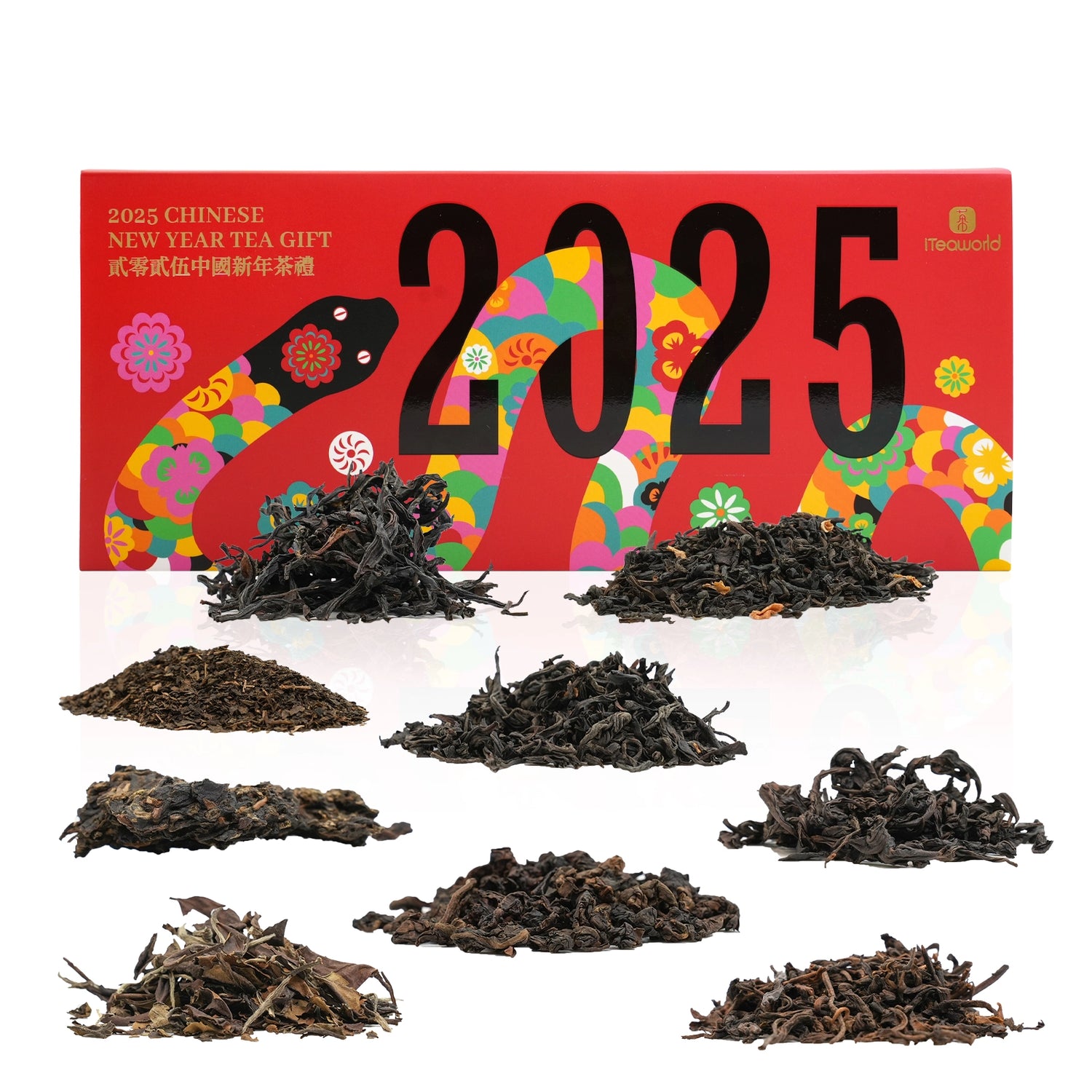
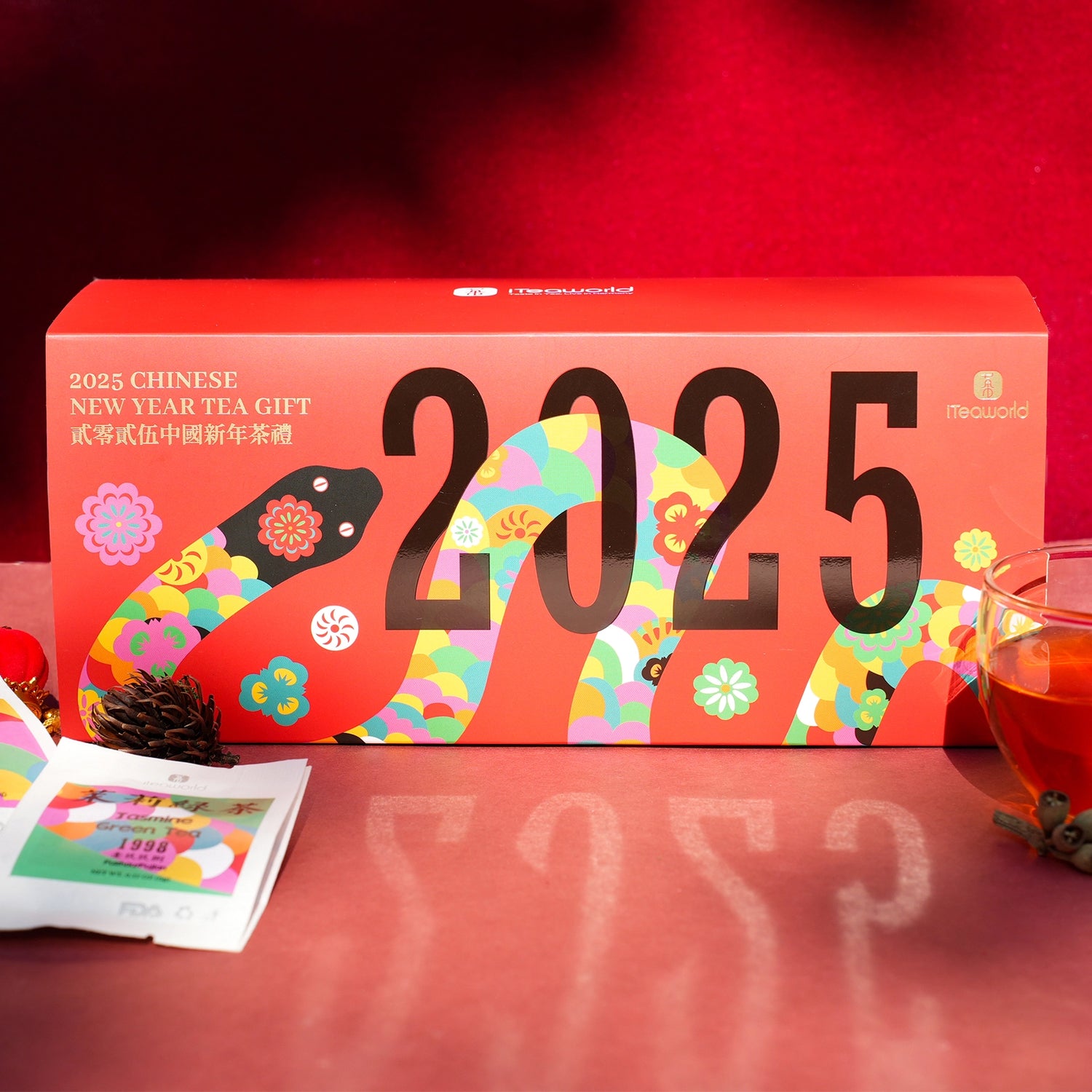
Коллекция выдержанного китайского чая 2025 года – 10 редких выдержанных чаев 100 г
$59.90 USD
Цена за единицу товара заКоллекция выдержанного китайского чая 2025 года – 10 редких выдержанных чаев 100 г
$59.90 USD
Цена за единицу товара заПочему именно этот продукт?
Многие люди не понимают, что считается выдержанным чаем и как определить его возраст. iTeaworld работает с выдержанным чаем на китайском рынке уже 20 лет. Мы считаем, что для того, чтобы чай считался «выдержанным», он должен соответствовать следующим трем критериям: 1. Он должен иметь выдержанный или древесный аромат. 2. Чайный настой должен быть мягким, насыщенным и сладким. 3. После питья должно ощущаться заметное тепло в теле, особенно в руках и ногах.
Основываясь на этом стандарте, мы отобрали 10 выдержанных чаев, включая улун, черный чай, белый чай, темный чай, пуэр и зеленый чай, чтобы помочь любителям чая понять, что на самом деле представляет собой выдержанный чай.
В состав продукта входят:
Чай улун Шуйсянь 1995 года: 2 упаковки по 5 г каждая
Чай Те Гуань Инь Улун 1998 года: 2 упаковки по 5 г каждая
Чай улун Фэнхуан Даньцун 1995 года: 2 упаковки по 5 г каждая
1998 Сырой чай Пуэр: 2 пачки по 5 г каждая
Чай пуэр 2003 года созревания: 2 пачки по 5 г каждая
Темный чай Shuangzheng Liu Bao 2008 года: 2 пачки по 5 г каждая
Белый чай Шоу Мэй 2014 года: 2 упаковки по 5 г каждая
Черный чай Лапсанг Сушонг 2014 года: 2 пачки по 5 г каждая
Зеленый чай с жасмином 1998 года: 2 упаковки по 5 г каждая
Темный чай Fu Brick 1980-х годов: 2 пачки по 5 г каждая
Как заваривать:
Посуда для заваривания: белая фарфоровая гайвань или чайник «цзыша».
Температура воды: 95°C-100°C
Соотношение чая и воды: 1:15-25
Время заваривания: 10-20 секунд
Количество завариваний: 5-7 раз
Почему выдержанный чай все еще пригоден для питья:
Причина, по которой выдержанный чай все еще можно безопасно употреблять, заключается в уникальной химии чайных листьев и традиционных методах хранения. Чай содержит мощные антиоксиданты, такие как катехины и полифенолы, которые естественным образом помогают замедлить окисление, сохраняя чай пригодным для употребления в течение длительного времени. Сушеный чай поглощает только минимальное количество влаги и кислорода, то есть он не обеспечивает влажную среду, необходимую для роста бактерий. Пока чай хранится правильно — в сухом, прохладном месте и герметично закрыт от запахов — он не испортится, и вы можете наслаждаться им без беспокойства, если нет плесени или посторонних запахов.
Как выдерживаются разные виды чая:
Тёмный чай (Хэй Ча)
Темный чай, если его правильно выдерживать, подвергается микробным преобразованиям, которые смягчают его вкус. Со временем такие соединения, как кофеин и полифенолы, распадаются, меняя вкус с горького на мягкий и насыщенный. Темный чай требует особых условий хранения: сухого, проветриваемого и прохладного, чтобы поддержать этот процесс смягчения.
Белый чай
В Китае есть поговорка о белом чае: «Однолетний чай, трехлетнее лекарство, семилетнее сокровище». Выдержка в течение трех лет и более выявляет более насыщенные вкусы и усиливает его воспринимаемую лечебную ценность. По мере старения белого чая листья смягчаются по вкусу и аромату, создавая более многослойный опыт питья.
Черный чай
Черный чай обычно сохраняет свою естественную сладость и аромат с течением времени, и поскольку его вкус не улучшается с выдержкой, большинство черных чаев лучше всего употреблять в свежем виде. Однако некоторые виды прессованных черных чаев, такие как Fu Brick из Хунани, могут приобретать более глубокие вкусы при хранении из-за постепенных микробных изменений.
Чай улун
Обжаренные улуны, такие как Wuyi Rock Tea (Yan Cha), приобретают сложность с возрастом. Обжаренные ноты смягчаются, и чай приобретает характерный «выдержанный аромат», добавляя насыщенность и нотки сладости. Правильное хранение имеет важное значение для сохранения его уникальных характеристик: держите его сухим, вдали от прямых солнечных лучей и герметично закрытым, чтобы сохранить свежесть.
Зеленый чай с жасмином
Зеленый чай с жасмином, настоянный на свежих цветах жасмина, имеет уникальный цветочный аромат, которым лучше всего наслаждаться в течение одного-двух лет. Со временем компонент зеленого чая окисляется, что приводит к более темному цвету и более мягкой цветочной ноте. Чтобы сохранить аромат и свежесть жасмина, его лучше всего хранить герметично закрытым, в прохладном, сухом месте или даже в холодильнике, если это возможно.
Чтобы исследовать, как выдержка меняет вкус чая, мы выбрали пять чаев Миньнань Шуйсянь, обжаренных по традиционной технологии на углях, от зарубежной китайской чайной фабрики Yongchun Beikeng — урожая 1994, 2004, 2014, 2020 и 2024 годов.
Это дегустационное путешествие покажет, как время преображает богатый характер улуна Шуйсянь. Давайте вместе прочувствуем эту эволюцию.
В этот набор входит:
Чай Миньнань Шуйсянь 2024 года (обжаренный на углях, с насыщенным ароматом)* 20 г
Миньнань Шуйсянь 2019 года (обжаренный на углях, с насыщенным ароматом)* 20 г
Миньнань Шуйсянь 2014 года (обжаренный на углях, с насыщенным ароматом)* 20 г
Миньнань Шуйсянь 2004 года (обжаренный на углях, с насыщенным ароматом)* 20 г
1994 Minnan Shui Xian (обжаренный на углях, с насыщенным ароматом)* 20 г
Эволюция вкуса (для справки)
2024 (Новый Чай):
В чае доминирует натуральный аромат орхидеи с нотками обжаренных на углях нот. Аромат яркий и стойкий — при заваривании кипящей водой поднимающийся пар приобретает насыщенную цветочную ноту. Чай оставляет в чашке чистый, стойкий аромат. Вкус насыщенный, мягкий и сладкий, с богатым, но без горечи, послевкусием. Он обеспечивает выраженную, возвращающуюся сладость и долгое, стойкое послевкусие. Настой крепкий, но не слишком бодрящий.
5-летний (2020):
Аромат орхидеи угасает, угольные ноты отступают. Начинают проявляться нотки спелых фруктов и лёгкий оттенок свежей древесины. Появляется лёгкая кислинка, но чай всё ещё стимулирует слюноотделение. Общий вкус становится более мягким, хотя и немного тоньше по сложности.
10-летний (2015):
Кислотность уменьшается. Выдержанные ноты (например, сухое дерево) смешиваются с лёгкими оттенками орхидеи. Свежесть исчезает. Ликер становится шелковистым, а возвращающаяся сладость сменяется мягкостью, напоминающей каменно-сахарный вкус.
20-летний (2005):
В аромате доминируют выдержанные ноты (сандал, травы). Напиток приобретает янтарный цвет, становится густым и насыщенным, как рисовый суп. Послевкусие глубокое, с лекарственными оттенками.
30 лет (1995):
Сложное сочетание выдержанных и травяных нот (например, женьшеня и сушеной цитрусовой цедры). Напиток густой, мягкий и почти маслянистый. Сладость тонкая и изысканная, с длительным послевкусием, напоминающим выдержанный напиток.
Как заваривать?
Чайная посуда:
Для заваривания свежего чая используйте гайвань или исинский чайник.
Для чая, выдержанного 5–10 лет, используйте исинский чайник.
Для заваривания чая, выдержанного 20 лет и более, используйте старый исинский чайник или грубый глиняный горшок.
Температура воды:
Свежий чай: 95–100°C
Выдержанный чай: 100°C
Соотношение чая и воды:
1 г чая на 20 мл воды
Пробуждение чая:
Для чая, выдержанного 5–10 лет: откройте пакетик и дайте чаю подышать около 5 минут перед завариванием.
Для чая, выдержанного 20+ лет: откройте пакет и дайте ему проветриться за день.
Крутое время
Сначала промыть:
Первый заваривание: быстрое 3-секундное ополаскивание, сливаем — это нужно для того, чтобы чай прогрелся и пробудился.
2–4-е заваривание: 8–15 секунд
Начиная с 5-го заваривания: увеличивайте время на 5–10 секунд на каждую заварку.
Для выдержанного чая (20+ лет):
Можно заваривать непосредственно перед употреблением или заваривать в чайнике 10 раз перед кипячением.
Recently viewed products
Chat with fellow tea lovers, ask questions, and share your tea moments.
Часто задаваемые вопросы
Выдержанный чай относится к чаю, который выдерживался в течение нескольких лет, обычно от 3 до 40 лет . Со временем выдержанный чай приобретает более мягкий, глубокий вкусовой профиль с уменьшенной горечью и повышенной сложностью, в отличие от свежего чая , который сохраняет более яркий, травянистый вкус.
Выдержанный чай, особенно такие виды, как пуэр, улун и темный чай , может храниться десятилетиями, если хранить его в надлежащих условиях (прохладном, сухом и темном месте). Некоторые чаи улучшаются с возрастом, в то время как другие лучше всего подходят для употребления через несколько лет. Мы предлагаем чаи, выдержанные от 3 до 40 лет , каждый из которых бережно хранится в оригинальной упаковке для сохранения его качества.
Да! Выдержанный чай совершенно безопасен для питья, а процесс выдержки может фактически уменьшить резкость и увеличить его мягкость и сложность вкуса . Наши выдержанные чаи тщательно отбираются и хранятся, чтобы гарантировать наилучшее качество и вкус, и мы гарантируем их подлинность и свежесть благодаря оригинальной упаковке .
Вкус выдержанного чая известен тем, что он насыщенный, мягкий и сложный , с меньшей горечью по сравнению с молодыми чаями. Чай пуэр может развить землистые, древесные ноты, в то время как выдержанный улун и темный чай могут иметь цветочные или фруктовые ароматы. Зеленый чай с жасмином , выдержанный годами, может приобрести нежную сладость и мягкий аромат.
Заваривание выдержанного чая похоже на заваривание других видов чая, но ключ в том, чтобы использовать немного более низкую температуру воды и более длительное время заваривания, чтобы извлечь полный, насыщенный вкус. Вот общие рекомендации по завариванию:
- Чай Пуэр : 200°F (93°C), настаивать 1–3 минуты, повторить заваривание 3–5 раз.
- Чай улун : 190°F (88°C), заваривать 2–3 минуты, рекомендуется несколько завариваний.
- Темный чай : 200°F (93°C), заваривать 3–5 минут.
- Зеленый чай с жасмином : 175°F (80°C), заваривать 1-2 минуты.
Выдержанные чаи стоят дороже из-за своей редкости , длительного процесса созревания и тщательности хранения. Чаи, выдержанные 10 лет и более, особенно ценны, поскольку их запасы ограничены , и им требуется больше времени, чтобы полностью раскрыть свой потенциал. Уникальные, сложные вкусы, развивающиеся с течением времени, высоко ценятся ценителями чая .





